 Every year in December we’re busy making lists for Christmas giving and reviewing the many new books that release during the holiday season. With an annual off site event in early December, a store to run, and BookNotes to keep going, the annual Hearts & Minds “Best Books of the Year” lists gets pushed back until after the holidays. This year we’ve had a particularly early off site early January event, so I’m running behind even more. I’ve only been thinking about this for the last 12 months or so…
Every year in December we’re busy making lists for Christmas giving and reviewing the many new books that release during the holiday season. With an annual off site event in early December, a store to run, and BookNotes to keep going, the annual Hearts & Minds “Best Books of the Year” lists gets pushed back until after the holidays. This year we’ve had a particularly early off site early January event, so I’m running behind even more. I’ve only been thinking about this for the last 12 months or so…
Thanks to those who have inquired, those who have said they anticipate ordering a couple from our year’s end compendium. We are grateful for your support.
I like to give this big disclaimer, too. It’s hard for me to go public with this list — we are not presuming to be able to say with certainty which are the most significant books of the year (although we have some favorites that we sure hope have lasting significance.)
Best is a big word, maybe a bit too official; favorites may be a bit too fuzzy. Somewhere in that nether land between formal proclamation and mere happy suggestion lies our little list. These are important, I’m sure of it, and, usually, true delights for anyone who loves the printed page, offering pleasure and provocation, thoughtfulness and stimulation as a good book should. I throw in a couple of curve balls, too, just because I can.
And so, here’s our offering of a list of great books released in 2016 that caught our fancy and that we want to award. These are all non-fiction books for adults and all are worthy of honor. Perhaps we’ll name some our our favorite novels and kids books eventually.
First, our top ten awards. And then a whole bunch of very worthy very honorable mentions.
TOP TEN (NONFICTION) BEST BOOKS OF 2016
BOOK OF THE YEAR
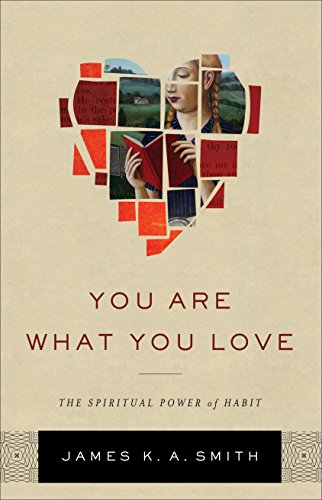 You Are What You Love: The Spiritual Power of Habit James K.A. Smith (Brazos Press) $19.99 I’ve been saying this is the most important and truly best book of 2016 since I read an early version in February or March. It is informed by important stuff of the sort we’ve been talking about for years; it really is a Hearts & Minds-ish kind of read. It has been widely acclaimed and although I value the “cultural liturgies trilogy” from which it is drawn and popularized (Imagining the Kingdom and Desiring the Kingdom are the first two published with the third to come out next year) this one volume summary is substantive enough to be a serious read, but accessible enough for nearly anyone to work through. The ideas in You Are What You Love are fresh, the writing vivid and urgent, the vision broad and culturally significant. It is, without a doubt, my pick for Best Book of 2016. It covers topics such as worldview and cultural engagement, worship and liturgy, habits and how personal change happens, and what it means to live out a new set of Kingdom desires and God-shaped practices in daily life, in home, work, and society. Buy a few of this winner, please, knowing that you are helping create a different sort of conversation in the Christian community, knowing that many from all over are reading, discussing, plotting about, and drawing upon this bold, good work. Allow me to be clear” of the thousands of books I’ve reviewed and the many, many more I’ve read in my life, this, I think, is in the top handful of most important books I’ve ever read.
You Are What You Love: The Spiritual Power of Habit James K.A. Smith (Brazos Press) $19.99 I’ve been saying this is the most important and truly best book of 2016 since I read an early version in February or March. It is informed by important stuff of the sort we’ve been talking about for years; it really is a Hearts & Minds-ish kind of read. It has been widely acclaimed and although I value the “cultural liturgies trilogy” from which it is drawn and popularized (Imagining the Kingdom and Desiring the Kingdom are the first two published with the third to come out next year) this one volume summary is substantive enough to be a serious read, but accessible enough for nearly anyone to work through. The ideas in You Are What You Love are fresh, the writing vivid and urgent, the vision broad and culturally significant. It is, without a doubt, my pick for Best Book of 2016. It covers topics such as worldview and cultural engagement, worship and liturgy, habits and how personal change happens, and what it means to live out a new set of Kingdom desires and God-shaped practices in daily life, in home, work, and society. Buy a few of this winner, please, knowing that you are helping create a different sort of conversation in the Christian community, knowing that many from all over are reading, discussing, plotting about, and drawing upon this bold, good work. Allow me to be clear” of the thousands of books I’ve reviewed and the many, many more I’ve read in my life, this, I think, is in the top handful of most important books I’ve ever read.
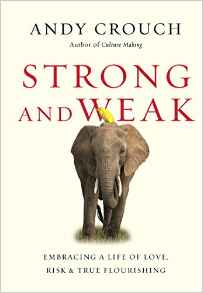 Strong and Weak: Embracing a Life of Love, Risk, and True Flourishing Andy Crouch (IVP) $20.00 Again, you can see my long review of this at the Hearts & Minds BookNotes newsletter and I do hope you go back and find it — I explained this book in great detail as it is such a very fascinating idea. It is not about “balancing” strength and weakness but it is about fully embracing both, living a life of exercising cultural power and trusting the process of risk-taking; that is, being both strong and vulnerable, using power but being willing to suffer the price. It is about Christ-like postures of cultural engagement, giving a very unique description and stamp upon our daily Christian habits and lifestyles and tendencies. Beth and I both have been taken by Andy’s good work and this stimulating book has charmed and challenged us, as it will you, I’m sure, for years to come. I do hope you have read his Culture Making and Playing God which, in a way, is somehow connected to this one, or so it seems to me. Strong and Weak: Embracing a life of Love, Risk and True Flourishing is without a doubt one of the very best books of this year. Very, very highly recommended. By the way, look for a new Andy Crouch book coming this April, a short and very accessible intro to family conversations about digital technology The Tech-Wise Family: Everyday Steps for Putting Technology in Its Proper Place (Baker; $13.99.)
Strong and Weak: Embracing a Life of Love, Risk, and True Flourishing Andy Crouch (IVP) $20.00 Again, you can see my long review of this at the Hearts & Minds BookNotes newsletter and I do hope you go back and find it — I explained this book in great detail as it is such a very fascinating idea. It is not about “balancing” strength and weakness but it is about fully embracing both, living a life of exercising cultural power and trusting the process of risk-taking; that is, being both strong and vulnerable, using power but being willing to suffer the price. It is about Christ-like postures of cultural engagement, giving a very unique description and stamp upon our daily Christian habits and lifestyles and tendencies. Beth and I both have been taken by Andy’s good work and this stimulating book has charmed and challenged us, as it will you, I’m sure, for years to come. I do hope you have read his Culture Making and Playing God which, in a way, is somehow connected to this one, or so it seems to me. Strong and Weak: Embracing a life of Love, Risk and True Flourishing is without a doubt one of the very best books of this year. Very, very highly recommended. By the way, look for a new Andy Crouch book coming this April, a short and very accessible intro to family conversations about digital technology The Tech-Wise Family: Everyday Steps for Putting Technology in Its Proper Place (Baker; $13.99.)
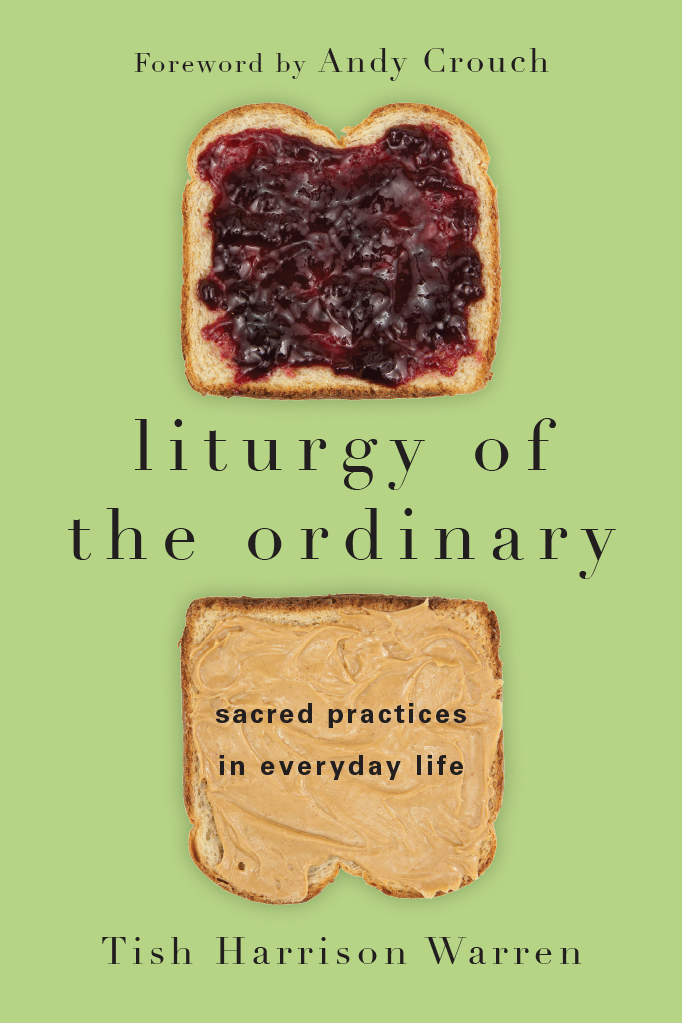 Liturgy of the Ordinary: Sacred Practices in Everyday Life Tish Harrison Warren (IVP) $16.00 I think this may be the non-fiction book I enjoyed the very most this year and from what I hear it is the favorite of many, even though it only came out in late November. As I explained in our long BookNotes review it is about the spirituality of the daily, walking through a day in the author’s rather normal life, informed by spiritual attitudes learned through Christian worship. She is drawing on Jamie Smith (yes!) and the wonderful forward is by Andy Crouch (yes, again!) No wonder I love this woman and her new book — what a helpful approach, wise and thoughtful, artful and solid. It allows us to see God’s hand in everything, to make beautiful the ordinary stuff of daily life, and it shows how worship, while firstly about God, is also about God’s reign being incarnated in our own feeble lives as we connect the liturgies of Sunday with the rituals of our day to day lives.
Liturgy of the Ordinary: Sacred Practices in Everyday Life Tish Harrison Warren (IVP) $16.00 I think this may be the non-fiction book I enjoyed the very most this year and from what I hear it is the favorite of many, even though it only came out in late November. As I explained in our long BookNotes review it is about the spirituality of the daily, walking through a day in the author’s rather normal life, informed by spiritual attitudes learned through Christian worship. She is drawing on Jamie Smith (yes!) and the wonderful forward is by Andy Crouch (yes, again!) No wonder I love this woman and her new book — what a helpful approach, wise and thoughtful, artful and solid. It allows us to see God’s hand in everything, to make beautiful the ordinary stuff of daily life, and it shows how worship, while firstly about God, is also about God’s reign being incarnated in our own feeble lives as we connect the liturgies of Sunday with the rituals of our day to day lives.
This wonderfully conceived — again, it’s a day in her life! — and beautifully written book is eloquent, sassy, fun, intelligent, and at times poignant. One of the very best of the year, without a doubt! It is very, very highly recommended, deserving to be on the short list of the top few books I’ve read all year.
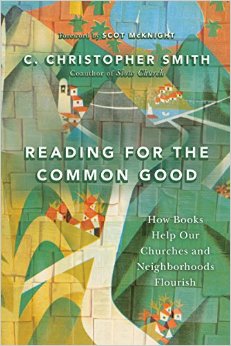 Reading for the Common Good: How Books Help Our Churches and Neighborhoods Flourish C. Christopher Smith (IVP) $16.00 Well. Do I hear an “A-men?” Or as Springsteen put it, “Is anybody alive out there?” This is a book that is so naturally important to the Hearts & Minds community that it deserves perhaps some special award of merit, some blue ribbon, some commemorative plaque. I am surprised that every Christian bookstore in America isn’t touting this; if I had the money I’d be giving it away by the box-load. Truly, the vision of reading well, reading widely, missionally, using our minds, the gifts of writers, poets, scholars who create books, is so clearly stated that Chris Smith has become nearly the patron saint for booksellers and book lovers everywhere. And yet, oddly, I don’t think the book is zooming up the best-seller charts. Why is that?
Reading for the Common Good: How Books Help Our Churches and Neighborhoods Flourish C. Christopher Smith (IVP) $16.00 Well. Do I hear an “A-men?” Or as Springsteen put it, “Is anybody alive out there?” This is a book that is so naturally important to the Hearts & Minds community that it deserves perhaps some special award of merit, some blue ribbon, some commemorative plaque. I am surprised that every Christian bookstore in America isn’t touting this; if I had the money I’d be giving it away by the box-load. Truly, the vision of reading well, reading widely, missionally, using our minds, the gifts of writers, poets, scholars who create books, is so clearly stated that Chris Smith has become nearly the patron saint for booksellers and book lovers everywhere. And yet, oddly, I don’t think the book is zooming up the best-seller charts. Why is that?
I’ll tell you why; well, at least partially why. You see, we are in a bit of a crisis. The printed page isn’t valued among us. The use of books has often been seen as trivial — an escape for those that like silly stories, or as academic — for those who are brainy and into that sort of stuff. But to see that books can be spiritual tools for our deep edification and agents of Kingdom outreach and social transformation, well, it’s the stuff of the best of our history — think of the savvy use of the printing press in the Lutheran reformation or the emphasis on schooling in Calvin’s Geneva or the life-changing spiritual reading method of the Methodists or the community William Wilberforce and others built around reading known as the Clapham sect who stopped slavery in England, or the Inklings, even — but isn’t embraced as much today as it might be. Hence, this book is more urgent then many realize. More healing and life giving than our sick churches know. Oh how I wish this book would be embraced widely.
I know you know all this, friends. You are those who read our arcane lists, buy our books, support our bookish ministry in the world. I am sorry to preach to the choir. Still, I want to honor Chris and his good book, celebrating his vision and his publishers eagerness to keep reading alive, keep book conversations alive, continuing to promote books as tools of the Kingdom. You simply have to read Reading for the Common Good to be reminded. Maybe you, too, will be so inspired as to say it was one of the best books of the year.
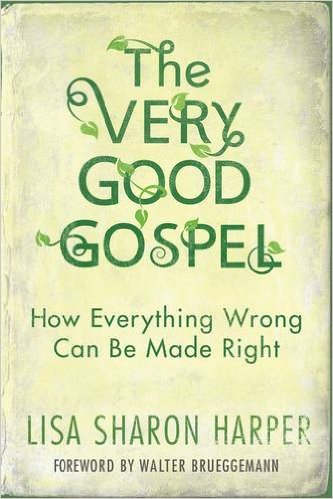 The Very Good Gospel: How Everything Wrong Can Be Made Right Lisa Sharon Harper (Waterbrook Press) $19.99 For the last five years Beth and I have hosted a major lecture in Pittsburgh which we’ve underwritten in order to give back to our many friends and customers in Pittsburgh a bit of excitement that comes with meeting an author with a big new book. Lisa Sharon Harper is a woman we’ve know a bit over the years and is a person we admire a lot. Her work with InterVarsity Christian Fellowship and her leadership in New York Justice and eventually her finding a home working with our old acquaintance Jim Wallis at Sojourners just has left us glad and inspired. Agree or not with all of her activism, she is a Godly woman with a love for Christ and His ways that is palpable. Her balance of prayerfulness and evangelism, social action and prophetic political witness is a sight to behold. Her work deserves to be known, her witness is commendable and this book is fabulous.
The Very Good Gospel: How Everything Wrong Can Be Made Right Lisa Sharon Harper (Waterbrook Press) $19.99 For the last five years Beth and I have hosted a major lecture in Pittsburgh which we’ve underwritten in order to give back to our many friends and customers in Pittsburgh a bit of excitement that comes with meeting an author with a big new book. Lisa Sharon Harper is a woman we’ve know a bit over the years and is a person we admire a lot. Her work with InterVarsity Christian Fellowship and her leadership in New York Justice and eventually her finding a home working with our old acquaintance Jim Wallis at Sojourners just has left us glad and inspired. Agree or not with all of her activism, she is a Godly woman with a love for Christ and His ways that is palpable. Her balance of prayerfulness and evangelism, social action and prophetic political witness is a sight to behold. Her work deserves to be known, her witness is commendable and this book is fabulous.
Lisa’s new book, then, is a window into her life, a bit of poignant memoir, vivid storytelling, testimony. Mostly, though, it walks us through the Biblical narrative — the goodness of shalom in the original creation narrative, the disruption and vandalization of that shalom in the story of “the fall” which we now sometime call alienation, and the promise and fulfillment of the healing of that — the gospel word is reconciliation! — that defines the very good news that is the gospel. That story — how Lisa came to this broader understanding of the full scope of the gospel and how to tell it as liberation, peace, health, wholeness, shalom in a way that is Christ-centered and Bible-based is the tale of this book. It is her story, but, in a way, it is a retelling of the story.
But it doesn’t end there — it isn’t just a narrative of an evangelical gal learning a bit more broad and culturally aware view of the Biblical teaching of the Kingdom, Christ restoring shalom. It is the project of the second half of the book to flesh out what reconciling shalom might look like in various spheres where we find great alienation. How to push back the brokenness, heal the hurts, be agents of transformation? From distortions and alienation between genders, between races, between nations, from our need to be reconciled to God to our need to be reconciled to our very selves, Lisa tells powerful stories and offers great guidance on how to live as a people committed to this ministry of reconciliation.
I love the evangelical strength of this Godly woman and her vibrant faith comes shining through The Very Good Gospel; it is obvious to us that it is one of the best books of his year and deserves the attention it has been getting. I also value how Harper is able to point us towards the social implications and out-workings of this very good gospel, not as add-ons or mere secondary stuff we might get to later, but as core, key, central , integral — here is the vision of a wholistic faith (personal but not private as her boss Jim Wallis puts it) that we’ve been working for for forty years. Thank, you Lisa, thank you Multnomah Press, thank you readers for buying this book and making it well known. Very good indeed.
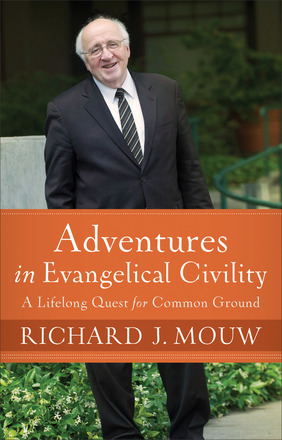 Adventures in Evangelical Civility: A Lifelong Quest for Common Ground Richard Mouw (Brazos Press) $24.99 I hope my previous BookNotes newsletter review of this was interesting to you — the book might sound a bit arcane if you don’t know and esteem Mouw as we do. I mentioned that I selected him to be in my little book that I edited (Serious Dreams: Bold Ideas for the Rest of Your Life ) not to brag (well, okay, I’m bragging a little) but to let you know that Mouw is an author that we truly esteem, who is in our circle of favorites, that represents much that we value. And he is such a thoughtful and clear writer. If you like Hearts & Minds or find us interesting at all, you should know that we get some of it from Mouw. If you like us, you should read him. And this is one of his to read, for sure!
Adventures in Evangelical Civility: A Lifelong Quest for Common Ground Richard Mouw (Brazos Press) $24.99 I hope my previous BookNotes newsletter review of this was interesting to you — the book might sound a bit arcane if you don’t know and esteem Mouw as we do. I mentioned that I selected him to be in my little book that I edited (Serious Dreams: Bold Ideas for the Rest of Your Life ) not to brag (well, okay, I’m bragging a little) but to let you know that Mouw is an author that we truly esteem, who is in our circle of favorites, that represents much that we value. And he is such a thoughtful and clear writer. If you like Hearts & Minds or find us interesting at all, you should know that we get some of it from Mouw. If you like us, you should read him. And this is one of his to read, for sure!
Why this one when he has written so many wonderful things? Simple — this is his intellectual memoir, a biography of the books and ideas and issues he’s struggled with over his storied life and how he came to the attitudes, theological views and conclusions he has. As a Reformed Christian with evangelical piety he has spent much time in dialogue with Anabaptists and Mennonites around issues of peacemaking, say; he curiously has been in deep theological discourse with Mormons. His interest in Protestant/Roman Catholic dialogue goes way back. He is a political theorist and philosopher so he has had to grapple with important work of intellectual depth and he has had to figure out how to make his way as a Christian scholar in the mainstream academy. All of this stuff is important and his testimony of how he has done that is commendable and, frankly, I found it riveting. Anyone who is concerned about reading widely or who is engaged in scholarship within the world of higher education will be thrilled to see how brother Mouw worked out his own calling as a scholar.
One of the big themes of Adventures in Evangelical Civility is evident in the title and subtitle. Mouw is known for civility and for a quest for common ground. Drawing on the theological notion of “common grace” as taught by Dutch Reformed leader Abraham Kuyper, Mouw essentially searches for what is normative, helpful, beautiful, good in any theory, movement, trend of person. It is easy (and often vital) to be critical; Mouw’s first instinct, though, is to affirm the good, to build bridges, to seek commonality and to be gracious and civil.
I think this great book, therefore, is a vital resource for anyone wanting to work out their own vocations “in the world but not of it.” Butcher, baker, candlestick-maker, we all have associations and spheres of influences — churches, schools, networks, and neighborhoods and we have to make our way in them. Learning to relate well to the cultures around us and the institutions in which we find ourselves is important, and Professor Mouw gives us much guidance.
Further, who these days doesn’t need some good examples of building consensus, of finding common ground, of being civil, of learning from others even if we are fundamentally different than them? In this new post-Trump era, we all need help at this. Mouw has lived through much, has kept good records of his thoughts and fears, his insights and mistakes, and this memoir is a wonderful guidebook to learning to take similar adventures as he has.
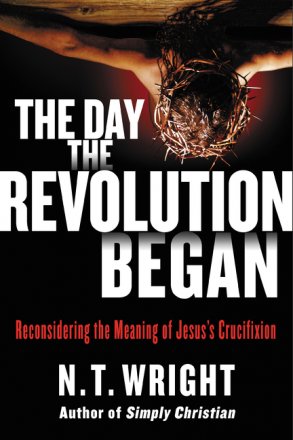 The Day the Revolution Began: Reconsidering the Meaning of Jesus’s Crucifixion N.T. Wright (HarperOne) $28.99 This is a must-read for anyone interested in Biblical studies or contemporary theology. It is a key book in the Wright opus, a long-awaited follow up to his seminal Surprised by Hope. As I explained in my positive review when it released, it essentially is a study of the cross of Christ in the New Testament, explored in light of the “end of the story” — the restoration of creation. If that renewal of creation is the “end game” of the Biblical story, then we should understand Paul and the other New Testament writers teaching about the cross in light of that truth. This wonderful book uses new creation “realized eschatology” as a lens to study the cross of Christ. In this reading, Good Friday becomes “the day the revolution begins” and helps us live into Easter hope here and now. This is just fantastic — Biblical study with a big picture and inviting us to ponder the vision of how we embody and live out this “revolution” of new creation. One of the best Tom Wright books yet, and surely one of the best books of 2016. Order it today!
The Day the Revolution Began: Reconsidering the Meaning of Jesus’s Crucifixion N.T. Wright (HarperOne) $28.99 This is a must-read for anyone interested in Biblical studies or contemporary theology. It is a key book in the Wright opus, a long-awaited follow up to his seminal Surprised by Hope. As I explained in my positive review when it released, it essentially is a study of the cross of Christ in the New Testament, explored in light of the “end of the story” — the restoration of creation. If that renewal of creation is the “end game” of the Biblical story, then we should understand Paul and the other New Testament writers teaching about the cross in light of that truth. This wonderful book uses new creation “realized eschatology” as a lens to study the cross of Christ. In this reading, Good Friday becomes “the day the revolution begins” and helps us live into Easter hope here and now. This is just fantastic — Biblical study with a big picture and inviting us to ponder the vision of how we embody and live out this “revolution” of new creation. One of the best Tom Wright books yet, and surely one of the best books of 2016. Order it today!
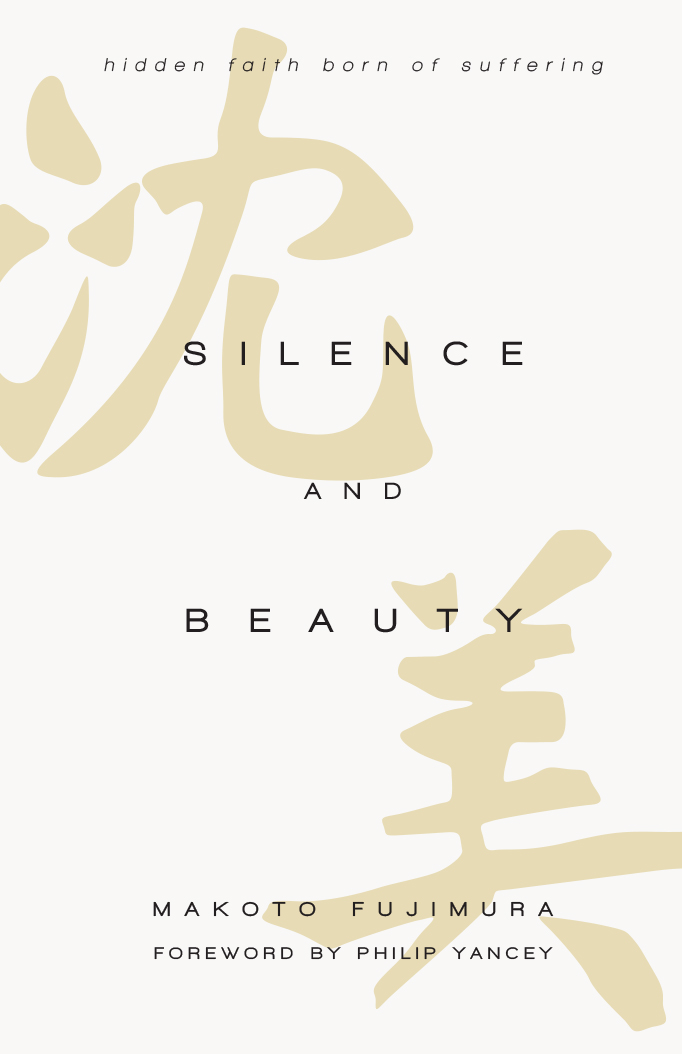 Silence and Beauty: Hidden Faith Born of Suffering Makoto Fujimura (IVP) $26.00 Oh my, I do hope you know this. It is, as I explained in our March BookNotes, a companion to the famous Japanese novel Silence by Shusaku Endo; we were delighted that many mail order customers and a few local friends here in the shop bought both the Fujimura book and Endo’s Silence (in its handsome new movie tie-in edition.) This is very relevant now as the long-awaited film version of the novel, directed and produced by Martin Scorsese, just released to much acclaim.
Silence and Beauty: Hidden Faith Born of Suffering Makoto Fujimura (IVP) $26.00 Oh my, I do hope you know this. It is, as I explained in our March BookNotes, a companion to the famous Japanese novel Silence by Shusaku Endo; we were delighted that many mail order customers and a few local friends here in the shop bought both the Fujimura book and Endo’s Silence (in its handsome new movie tie-in edition.) This is very relevant now as the long-awaited film version of the novel, directed and produced by Martin Scorsese, just released to much acclaim.
Makoto Fujimura is an esteemed and increasingly well–known Japanese–American abstract artist whose several books we stock and regularly promote. His own conversion to Christian faith happened while he was studying an ancient Japanese style of art (of which he is now a modern master) in Nagasaki, Japan, where he discovered Endo’s powerful novel about the silence of God during the brutal persecution of Japanese Christians in the 1600s. Fujimura’s new book tells of how Endo’s novel was important to him and uses his own experience as an artist of Christian faith to explore this same question — where is God in adversity, what do we do about suffering, why, why, why? In the face of evil and gross hardship, can we know a God who offers meaning and hope? Can the arts bring some semblance of truth to this question; that is, can beauty help us understand suffering?
Mr. Fujimura’s book title is not trite and his book is not simple. It is a serious and at times luminous reflection — refraction would be a good word, one that Mako likes — about beauty, about the arts, about the calling of artists and writers and sets that in conversation with the horror of the persecution Mr. Endo’s novel explores. What is the relationship, then, between silence and beauty? As I said in that initial review, there is a splendid overview of Endo and of Mako’s work in the great introduction by Philip Yancey. It, too, should be honored. The dust jacket of this marvelous book, made with a thin, translucent paper that conjures Asian rice paper is elegant and artful; the designer has won awards for best book cover design as well. What a great package, what a great set of ideas, what a great bit of writing, what a great, great book. I cannot overstate how good it is, how wise and helpful. Congratulations to all involved.
Do check out this absolutely wonderful website produced by Makoto and his team that includes videos and a study guide for the book Silence and Beauty. This is an exceptionally rich resource, offered as a gift. Enjoy.
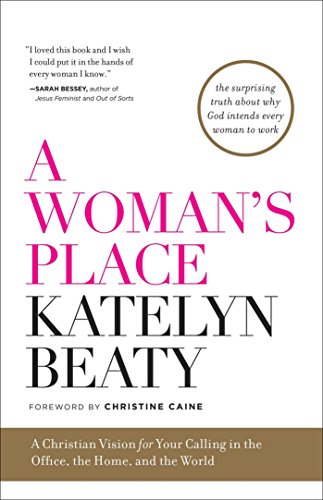 A Woman’s Place: A Christian Vision for Your Calling in the Office, the Home, and the World Katelyn Beaty (Howard Books) $22.99 Of course our very favorite books of the year have already been reviewed at greater length at BookNotes and A Woman’s Place is no exception. You can visit our BookNotes review by searching our archives at the website. I was initially worried that although we have many, many books on the relationship between faith and work and the notions of vocation and calling as we live out faith in our job sites and workplaces that not too much more could or needed to be said. Many of the very good books we’ve seen in recent years are fine, but do not present much new.
A Woman’s Place: A Christian Vision for Your Calling in the Office, the Home, and the World Katelyn Beaty (Howard Books) $22.99 Of course our very favorite books of the year have already been reviewed at greater length at BookNotes and A Woman’s Place is no exception. You can visit our BookNotes review by searching our archives at the website. I was initially worried that although we have many, many books on the relationship between faith and work and the notions of vocation and calling as we live out faith in our job sites and workplaces that not too much more could or needed to be said. Many of the very good books we’ve seen in recent years are fine, but do not present much new.
Katelyn Beaty proved me very wrong as she brings to this conversation a young woman’s voice, a journalists style and a whole lot of Kingdom vision. The broad and cosmic scope of Christ’s redemptive power and the subsequent high view of culture and work — all of life is being redeemed, after all — seems to be in her very bones. She seems nearly a daughter of Kuyper in this regard (“every square inch” is claimed by Christ, you know.) Of course, having a robust and relevant Christian worldview is not enough. What more can she say about faith and work, calling and career that hasn’t been said?
The key is obvious from the title: Ms Beaty is offering a woman’s voice in this conversation. Interestingly, most of the best books about faith and work are written by men; sadly most seem to be written for men. (Beaty mentions that in some large churches that are wise enough to have a “faith and work” ministry or a “marketplace mission” department, it is located within the “men’s ministry” of the church. What?
Beaty’s book is not just for women, although surely any woman in the workplace will want to have their own copy. Women, I suppose, are the primary audience for this important contribution. However, I am not the only one who has said that men should read this, too — it offers good insight about gender and work, gender and home, work and family, and more. Men need to be a part of this conversation and men need to hear the unique challenges faced by Christian women as they try to bring their own gifts and insights to the workplace, the culture, the home. I hope this book gets a wide readership. It is one of the best of the year, one of the rare books that we can say there is simply nothing like it in print. Hooray.
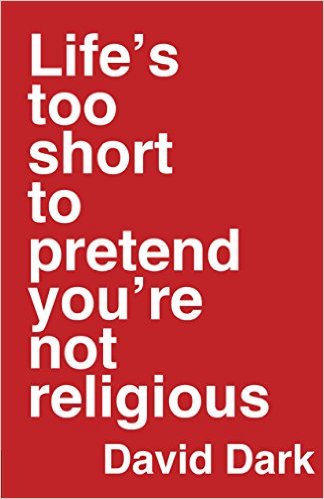 Life’s Too Short to Pretend You’re Not Religious David Dark (IVP) $20.00 This almost didn’t made it into our Hearts & Minds top ten of Best Books of 2016 even though I personally would say that it was one of my very favorite books of the year; heck I got a certain pleasure from reading it that I can hardly name — it’s one of the most curiously interesting books I’ve read in years! I don’t always recommend it with such abandon to everyone, though, because, well, it is quirky, perhaps not for everyone; an acquired taste. Still I have to honor it — David is a robust writer and Life’s Too Short to Pretend… is truly a great book, colorfully written, eccentric at times, curious, interesting, deep, honest, prophetic. It challenges both the glibly “spiritual but not religious” crowd insisting that everyone is fundamentally religious — driven by some stories or images that become narratives of ultimate concern — as well as those who want to reduce religion to a formula or dogma or creed as if intellectual assent to some set of truth claims is all there is to the mystery of faith, religion, life. He’ll have none of it — but yet, Dark doesn’t spend much time denouncing inadequate social imaginaries or bad, dualistic stories or shallow, selfish visions. He just offers a better vision, tells a deeper story, invites us into his own ruminations as he shares, wearing his heart on his sleeve, bearing witness that deep stuff happens when one is attentive.
Life’s Too Short to Pretend You’re Not Religious David Dark (IVP) $20.00 This almost didn’t made it into our Hearts & Minds top ten of Best Books of 2016 even though I personally would say that it was one of my very favorite books of the year; heck I got a certain pleasure from reading it that I can hardly name — it’s one of the most curiously interesting books I’ve read in years! I don’t always recommend it with such abandon to everyone, though, because, well, it is quirky, perhaps not for everyone; an acquired taste. Still I have to honor it — David is a robust writer and Life’s Too Short to Pretend… is truly a great book, colorfully written, eccentric at times, curious, interesting, deep, honest, prophetic. It challenges both the glibly “spiritual but not religious” crowd insisting that everyone is fundamentally religious — driven by some stories or images that become narratives of ultimate concern — as well as those who want to reduce religion to a formula or dogma or creed as if intellectual assent to some set of truth claims is all there is to the mystery of faith, religion, life. He’ll have none of it — but yet, Dark doesn’t spend much time denouncing inadequate social imaginaries or bad, dualistic stories or shallow, selfish visions. He just offers a better vision, tells a deeper story, invites us into his own ruminations as he shares, wearing his heart on his sleeve, bearing witness that deep stuff happens when one is attentive.
My, my, this is an interesting book, full of wit and passion and a few stories you will never forget. It is most obviously for the artsy and bohemian — he loves old poetry and hip, pop culture, postmodern literature and radical history, sincere love songs and funny comics, citing rock singers and movie makers, philosophers and peace activists — but it is also for anyone who likes to think about the truest truths, the way the world really works, by way of hearing how one guy sorts it all out. It is, as the Robbie Robertson rock and roll book (see below) is entitled, “testimony.” And it is testimony about life, stories, art, and faith — and how that can bring us together, uniting us as human beings in search of meaning and justice and joy.
My friend C. Christopher Smith (of Reading for the Common Good and Slow Church) has a blurb on the book which is pretty perfect:
David Dark is one of the most important prophetic voices of our day. Life’s Too Short To Pretend You’re Not Religious is another beautiful demonstration of the winsome way in which he unsettles our language and our imagination. Not content to unravel the basic fabric of our existence, Dark re-weaves the fibers into a rich and vibrant vision of the flourishing religious life for which we were created.
Or listen to the social historian and lived theology prof, Charles Marsh, reflecting on Dark’s “luminous reckonings”:
… the result is a shock of recognition: life more abundant awaits us only in the deep immersions of togetherness with others. Here alone are the comedy and chaos that define the human condition and lead us gently or not into the strange new world of grace. Life’s Too Short to Pretend You’re Not Religious is an irresistible triumph.
BEST BOOKS of 2016 — HONORABLE MENTIONS
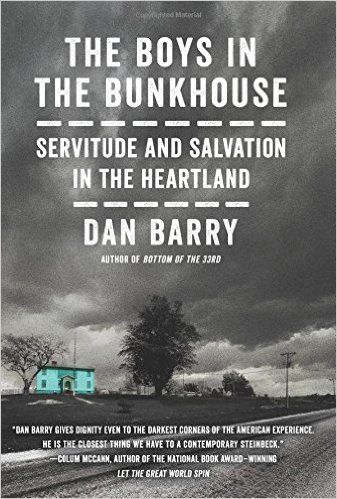 Boys in the Bunkhouse: Servitude and Salvation in the Heartland Dan Barry (Harper) $26.99 This thick book is an epic bit of investigative reporting and was, of all the books I read this year, the most haunting, and the one that I find the most heart-rending of all. I will never forget it. It is a long story, beautifully told by an excellent, insightful writer. If you don’t believe me about Dan Barry’s exquisite style, see his stunningly well-written memoir, which I also enjoyed this year, Pull Me Up: A Memoir or his well received and often-honored book about the longest baseball game Bottom of the 33rd: Hope, Redemption, and Baseball’s Longest Game.
Boys in the Bunkhouse: Servitude and Salvation in the Heartland Dan Barry (Harper) $26.99 This thick book is an epic bit of investigative reporting and was, of all the books I read this year, the most haunting, and the one that I find the most heart-rending of all. I will never forget it. It is a long story, beautifully told by an excellent, insightful writer. If you don’t believe me about Dan Barry’s exquisite style, see his stunningly well-written memoir, which I also enjoyed this year, Pull Me Up: A Memoir or his well received and often-honored book about the longest baseball game Bottom of the 33rd: Hope, Redemption, and Baseball’s Longest Game.
There is a reason Boys in the Bunkhouse has gotten such luminous reviews and has been called a “landmark achievement.”
Besides his good storytelling ability and his expert dogged research which combines to earn him the reputation as one of our best literary nonfiction writers, I think this quote from National Book Award winner Colum McCann captures why many are so struck by his work. “Dan Barry gives dignity even to the darkest corners of the American experience. He is the closest thing we have to a contemporary Steinbeck.”
Boys in the Bunkhouse tells the story of a group of intellectually handicapped men — boys when the story starts in 1960s Texas — who were essentially held captive and used as cheap hard labor in a poultry processing plant in Atalissa, Iowa for much of their lives. How could this be overlooked, the welfare of these workers forgotten for three decades, under the gaze of churches, neighbors, social workers, labor safety inspectors, politicians, and others? How did the well-intended effort of an apparently good man devolve into something so distorted and abusive, ending up so badly? How could such a thing happen in Red-state, decently religious, middle America? This is, as the dust jacket jarringly says, “A Dickensian tale from the heartland.”
It is also a “luminous work of social justice.”
Berry delves deep into their lives, summoning their memories and suffering, their tender moments of joy and persistent hopefulness — and, most of all, their endurance. He explores why this small town missed the tell tale signs of exploitations, details how those responsible for such profound indifference justified their actions, and chronicles the lasting impact of a dramatic court case that has spurred advocates to push for just pay and improved working conditions for people with disabilities.
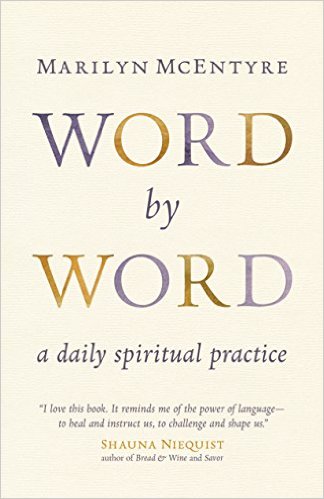 Word by Word: A Daily Spiritual Practice Marilyn McEntyre (Eerdmans) $17.99 Oh my, yes: this is a great, great book, a treasure for those who value good writing, who care about words, who want to ponder reflectively and would enjoy thinking about the meaning and implications of common words rather than a Bible devotional. One reviewer said it blends “exegesis, philology, lectio divina, and prayer.” In a way, it is similar in tone to her wonderful little 2014 volume that is Bible-based called What’s in a Phrase?: Pausing Where Scripture Gives You Pause. McEntyre is a poet and writer who teaches literature in a med school. (She has two excellent, small books emerging from her work in hospice care, A Faithful Farewell: Living Your Last Chapter with Love and A Long Letting Go: Meditations on Losing Someone You Love.)
Word by Word: A Daily Spiritual Practice Marilyn McEntyre (Eerdmans) $17.99 Oh my, yes: this is a great, great book, a treasure for those who value good writing, who care about words, who want to ponder reflectively and would enjoy thinking about the meaning and implications of common words rather than a Bible devotional. One reviewer said it blends “exegesis, philology, lectio divina, and prayer.” In a way, it is similar in tone to her wonderful little 2014 volume that is Bible-based called What’s in a Phrase?: Pausing Where Scripture Gives You Pause. McEntyre is a poet and writer who teaches literature in a med school. (She has two excellent, small books emerging from her work in hospice care, A Faithful Farewell: Living Your Last Chapter with Love and A Long Letting Go: Meditations on Losing Someone You Love.)
Marilyn has written one of my all time favorite books, Caring for Words in a Culture of Lies, which imagines words as God-given natural resources and asks what we might do to learn to steward them well. In a way, this recent one is a meditative companion to that visionary book about the ethics of speech, with a word or phrase to ponder each day, for a week, with prompts to consider various uses and ways to appreciate the word or phrase, such as She offers profound insights about words that she gives us to consider and it really works! What an engaging, moving, transformative book, written in a quiet, gentle manner.
When a writer and reader and preacher as good as Cornelius Plantinga recommends a book, it is worth noting. Of Word by Word he says:
McEntyre has again written with conspicuous grace and truth. She sees deeply into the Christian life. She writes simply and nobly, but with an enormous weight of discernment and suggestion. Some passages here are as powerful and lovely as any I’ve encountered in years.
 Celtic Daily Prayer: Book Two: Farther Up and Farther In Northumbria Community (William Collins) $34.99 We stock a good number of prayer books of various kinds and the first volume of this — Celtic Daily Prayer — has been one of our most popular for years, now. This sequel, with a beautiful cover and a few small format changes, is even better. This is a brand new two-year collection of daily readings and prayers, with Celtic themes and inspiration and we’re thrilled to name it as one of the best resources of the year. A solid, hand sized hardback with ribbon marker. Very nicely done.
Celtic Daily Prayer: Book Two: Farther Up and Farther In Northumbria Community (William Collins) $34.99 We stock a good number of prayer books of various kinds and the first volume of this — Celtic Daily Prayer — has been one of our most popular for years, now. This sequel, with a beautiful cover and a few small format changes, is even better. This is a brand new two-year collection of daily readings and prayers, with Celtic themes and inspiration and we’re thrilled to name it as one of the best resources of the year. A solid, hand sized hardback with ribbon marker. Very nicely done.
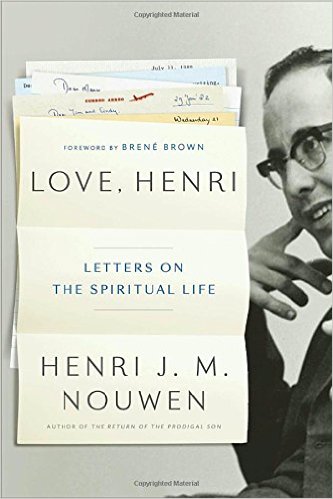 Love, Henri: Letters the Spiritual Life Henri
Love, Henri: Letters the Spiritual Life Henri
J. M. Nouwen (Convergent) $24.00 I will admit to not having dipped into this much, yet. But I know enough to know that this is a major literary event, a significant contribution by one of the great spiritual writers of the last century and an immensely important figure who helped Protestants, especially, learn to appreciate Catholic and contemplative expressions of faith. Fr. Nouwen was known for writing
letters — he kept nearly all of the 16,000 letters he received and he
responded to them all. Some of his replies, spanning two decades, are
very revealing, some quite tender, some summarizing things he wrote in
his many books. This very handsome hardback offers over 200 of his
letters offering wit, condolence, insight, spiritual guidance. As Sue
Mosteller writes in her epilogue, “I love this collection. It is for me,
a spiritual autobiography. Henri’s letters reveal the ever-evolving,
ever-deepening, ever-struggling heart of my strong yet vulnerable
friend.”
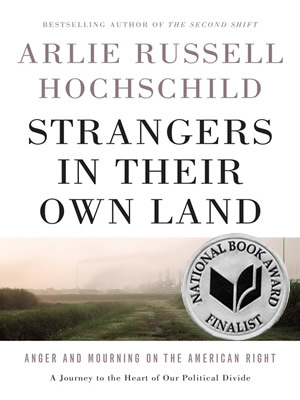 Strangers in Their Own Land : Anger and Mourning on the American Right — A Journey to the Heart of Our Political Divide Arlie Russell Hochschild (The New Press) $27.95 This has appeared on many lists and the reasons are at least two fold: it is a serious, remarkable study about folks in Louisiana that support conservative politicians who want to gut EPA restrictions even as they lament the way pollution has ruined their livelihoods as shore-men and shrimpers and even as they are aware that the toxic pollution has given them exceedingly higher rates of cancer (in “Cancer Alley”) than nearly anywhere in the country. What a top notch bit of investigative reporting this is as the author embeds herself in this hurting community, so abused by chemical and oil companies, hearing them deeply about their own political convictions. So that’s one reason the book is achieving such renown — it’s a helluva story, vividly told, a story of great pathos about fellow citizens that needs to be told.
Strangers in Their Own Land : Anger and Mourning on the American Right — A Journey to the Heart of Our Political Divide Arlie Russell Hochschild (The New Press) $27.95 This has appeared on many lists and the reasons are at least two fold: it is a serious, remarkable study about folks in Louisiana that support conservative politicians who want to gut EPA restrictions even as they lament the way pollution has ruined their livelihoods as shore-men and shrimpers and even as they are aware that the toxic pollution has given them exceedingly higher rates of cancer (in “Cancer Alley”) than nearly anywhere in the country. What a top notch bit of investigative reporting this is as the author embeds herself in this hurting community, so abused by chemical and oil companies, hearing them deeply about their own political convictions. So that’s one reason the book is achieving such renown — it’s a helluva story, vividly told, a story of great pathos about fellow citizens that needs to be told.
Secondly, though, it is a meditation on why such blue-collar folk distrust elites and Washington and big government and media (etcetera etcetera.) This is the book to read for those who want to understand the Trump victory, it is the book to read if one wants to truly listen to those who are most likely pretty different than yourself.
The highly regarded author is unabashedly liberal in her own bias (as is the radical publisher) and the blurbs on the back illustrate that — Barbara Ehrenreich, Robert Reich and others. (Her other earlier award winning books include The Second Shift.) Here she is, trying to practice empathy and solidarity and to take seriously how others experience life and feel about it all. Mark Danner of Spiral: Trapped in the Forever War says “A powerful, imaginative, necessary book, arriving not a moment too soon.”
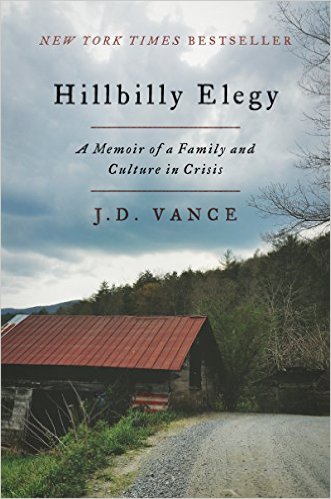 Hillbilly Elegy: A Memoir of a Family and Culture in Crisis J.D. Vance (Harper) $27.99 I have not yet published by long review of this and perhaps will soon but I must say this is without a doubt one of the most discussed, most appreciated, and biggest selling books of 2016. Although Vance writes for the conservative National Review and his story of the dysfunctions of poorer white folks in Appalachia and Rust Belt America has been used to explain the popularity of Mr. Trump, the book is not a political story but a human-scale memoir about a crazy family, broken social systems, and a guy who ends up in Yale Law School having made something of himself with help from loyal relatives, a reliable faith, and a stint in the US Marines. Some are saying this is their favorite memoir ever and while I wouldn’t say that, it was truly difficult to put down and I wouldn’t stop talking about it for months. If you haven’t read it yet, you really should. Hold on to your hat, it’s quite a story. One of the Best Books of 2016 without a doubt.
Hillbilly Elegy: A Memoir of a Family and Culture in Crisis J.D. Vance (Harper) $27.99 I have not yet published by long review of this and perhaps will soon but I must say this is without a doubt one of the most discussed, most appreciated, and biggest selling books of 2016. Although Vance writes for the conservative National Review and his story of the dysfunctions of poorer white folks in Appalachia and Rust Belt America has been used to explain the popularity of Mr. Trump, the book is not a political story but a human-scale memoir about a crazy family, broken social systems, and a guy who ends up in Yale Law School having made something of himself with help from loyal relatives, a reliable faith, and a stint in the US Marines. Some are saying this is their favorite memoir ever and while I wouldn’t say that, it was truly difficult to put down and I wouldn’t stop talking about it for months. If you haven’t read it yet, you really should. Hold on to your hat, it’s quite a story. One of the Best Books of 2016 without a doubt.
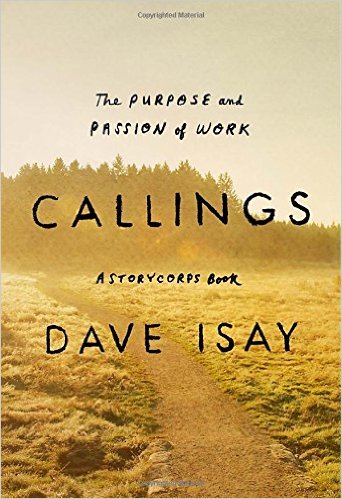 Callings: The Purpose and Passion of Work ( Storycorps Book ) Dave Isay (Penguin Press) $26.00 There have been many books over the years on the relationship of faith and work, informed by a Biblical vision of calling and the theology of vocation. This book came out of the beautiful, inspiring Storycorps radio program so is not overtly religious but it is, without a doubt, an enjoyable and inspiring read for people of faith and offers much to us to realize how so many different kind of people, in so many different kinds of job, talk about their work. In a way, this secular complication is one of the most beautiful examples of people’s search for meaning and the hope for purpose, articulated in various ways and tones and accents. No matter what your job is, reading these folks describe their own sense of passion about their work will inspire you. I was glad to introduce this at BookNotes when it first came out and think it is one of the best books of many a year.
Callings: The Purpose and Passion of Work ( Storycorps Book ) Dave Isay (Penguin Press) $26.00 There have been many books over the years on the relationship of faith and work, informed by a Biblical vision of calling and the theology of vocation. This book came out of the beautiful, inspiring Storycorps radio program so is not overtly religious but it is, without a doubt, an enjoyable and inspiring read for people of faith and offers much to us to realize how so many different kind of people, in so many different kinds of job, talk about their work. In a way, this secular complication is one of the most beautiful examples of people’s search for meaning and the hope for purpose, articulated in various ways and tones and accents. No matter what your job is, reading these folks describe their own sense of passion about their work will inspire you. I was glad to introduce this at BookNotes when it first came out and think it is one of the best books of many a year.
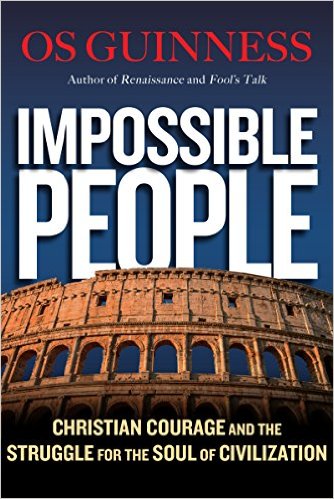 Impossible People: Christian Courage and the Struggle for the Soul of Civilization Os Guinness (IVP) $20.00 I did a long BookNotes review of this when it first came out and it is one of my favorite books of the year, even if it made me both uncomfortable in a good way and a bit irritated. I appreciate authors who are uncompromising in their conviction and Os is one of those leaders I count on for unsullied truth telling, courage and compunction. He is prophetic and yet caring, culturally savvy and yet helpful. This is Guinness at his feisty best.
Impossible People: Christian Courage and the Struggle for the Soul of Civilization Os Guinness (IVP) $20.00 I did a long BookNotes review of this when it first came out and it is one of my favorite books of the year, even if it made me both uncomfortable in a good way and a bit irritated. I appreciate authors who are uncompromising in their conviction and Os is one of those leaders I count on for unsullied truth telling, courage and compunction. He is prophetic and yet caring, culturally savvy and yet helpful. This is Guinness at his feisty best.
As you can see from my previous BookNotes reflection this book does at least two things really well — it is an overview of the forces and pressures of modernity, documenting and warning us about the seductive influences upon our worldviews and habits of things like choice and change and mobility (all made exceptionally practical and daily in things as simple as using the internet.) The secularizing forces of the vast cultural habitat we call modernity (and the perhaps overstated shift towards post modernity) are described in Impossible People almost as well as anywhere, and it is well worth having for that reason alone.
The heart of Dr. Guinness, though, does not beat primarily as an intellectual — he despises the phrase, actually — or as a cultural critic. Although he spends much of his time in global think tanks and confabs and such, Os is a brother in Christ speaking to his fellow Christians, sisters and brothers about whom he worries. Are our leaders — certainly in the old mainline churches and increasingly in the hip evangelical ones — selling out to the ideas and lifestyles, the values and attitudes, of secularized modernity? Are we becoming accommodated to our culture? Are we too concerned about worldly success and failing to hold our ground on fundamental matters of holiness and principle? Are we even unaware about how the first things of the gospel can be eroded by the ways of the world?
I think Os sometimes is a bit too strident although I know that he himself prayerfully struggles to write in a manner that is blunt about his concern about shallow theology and accommodated ways, without appearing judgmental or harsh. God bless him for such integrity — some writers blast away with little regard for the nuances and complexities of the targets of their barbs and others (perhaps the theme of this book) are too easily compromised. It is a hard and glorious balance to speak the truth in love, to be “impossible” as Os puts it. Impossible People, by the way, is pitched as a sequel to his lovely and important Renaissance: The Power of the Gospel However Dark the Times. You don’t have to read that first, but you should pick it u; it was a Hearts & Minds Best Book award winner in 2014.
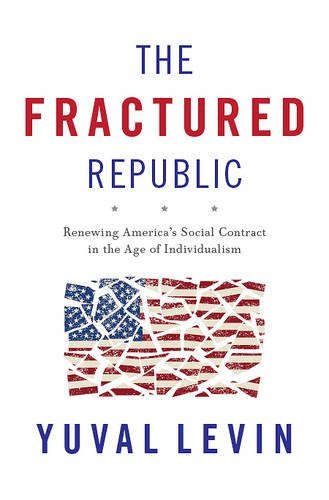 The Fractured Republic: Renewing America’s Social Contract in the Age of Individualism Yuval Levin (Basic Books) $27.50 Many social critics and political theorists have raved about this. It comes out of his work as a Fellow at the Ethics and Public Policy Center, a conservative think tank and is one of the most discussed books about public life that has come out this year. I’ve written about it a few places and highlighted it more than once in interviews and book talks. Here’s some of what I said in one BookNotes post: I hope that you have seen this reviewed and cited on the internet or in significant journals — I cannot wait to read this yet this summer as it has been promoted across the political spectrum as substantive and thoughtful. Left-leaning Jonathan Haidt (The Righteous Mind) says “this is the book American most needs in 2016” and Paul Ryan says “Yuval Levin is one of the most insightful and original thinkers of our time.” We are dangerously fragmented in this “age of individualism” and we must radically rethink our embeddedness in the ways of modernity which are played out here; Levin can help us develop a critique that is beyond the conventional far left and far right, showing how mediating structures and non-government institutions and neighborhoods can help rebuilding our republic. George Packer says of his humane and good writing that “His work gives the sense that our future needn’t be as grimly divided and dysfunctional as the present seems.” Let us know. This surely deserves to be considered one of the most significant books of 2016.
The Fractured Republic: Renewing America’s Social Contract in the Age of Individualism Yuval Levin (Basic Books) $27.50 Many social critics and political theorists have raved about this. It comes out of his work as a Fellow at the Ethics and Public Policy Center, a conservative think tank and is one of the most discussed books about public life that has come out this year. I’ve written about it a few places and highlighted it more than once in interviews and book talks. Here’s some of what I said in one BookNotes post: I hope that you have seen this reviewed and cited on the internet or in significant journals — I cannot wait to read this yet this summer as it has been promoted across the political spectrum as substantive and thoughtful. Left-leaning Jonathan Haidt (The Righteous Mind) says “this is the book American most needs in 2016” and Paul Ryan says “Yuval Levin is one of the most insightful and original thinkers of our time.” We are dangerously fragmented in this “age of individualism” and we must radically rethink our embeddedness in the ways of modernity which are played out here; Levin can help us develop a critique that is beyond the conventional far left and far right, showing how mediating structures and non-government institutions and neighborhoods can help rebuilding our republic. George Packer says of his humane and good writing that “His work gives the sense that our future needn’t be as grimly divided and dysfunctional as the present seems.” Let us know. This surely deserves to be considered one of the most significant books of 2016.
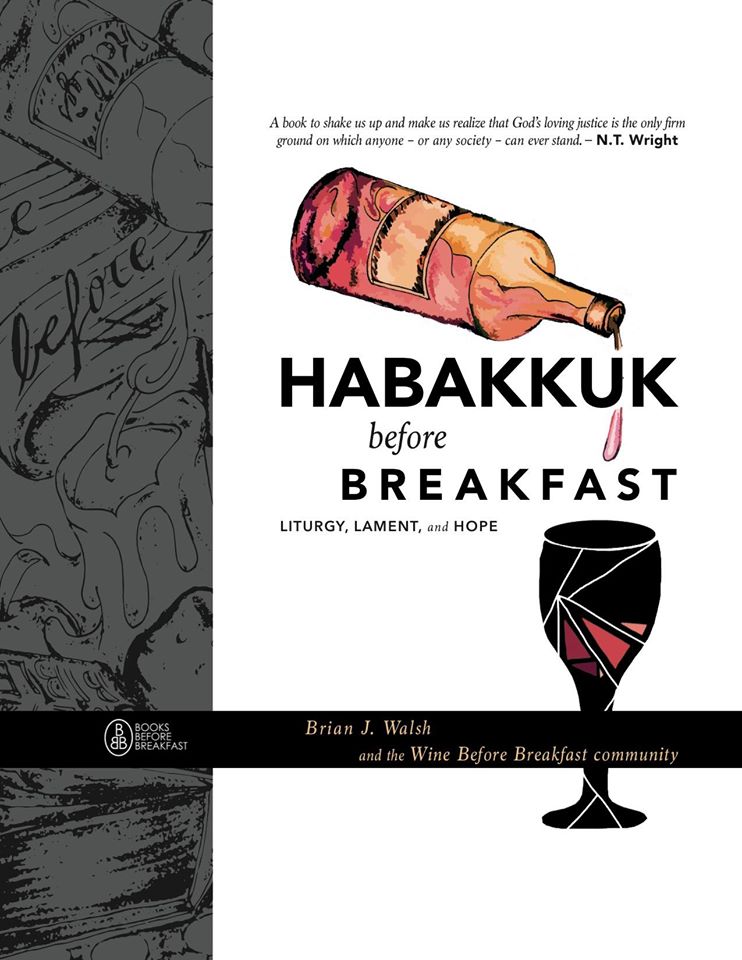 Habakkuk Before Breakfast: Liturgy, Lament and Hope Brian J. Walsh (Books Before Breakfast) $14.00 Done with the Wine Before Breakfast community at the University of Toronto, a group of students and others who gather for an early morning Eucharist service, this book offers the sermons and messages, the liturgies and litanies, the questions about music and the descriptions of songs played at their creative alt-services. Although the book is anchored by the study of this Old Testament prophet, there is tender stuff here (about a homeless guy who became an beloved member of their gang) and great reflection about the struggle to find mostly contemporary rock music that captured the themes of the service. The prayers and liturgical pieces are inspiring and useful, the Bible study stunning, the prophetic application uncompromising. I wrote a longer review back at BookNotes if you want to hear more but this truly is an extraordinary work. I assume you know Walsh from books like Transforming Vision, Truth Is Stranger Than It Used to Be, Colossians Remixed, or Beyond Homelessness. (Not to mention his wonderful survey of the lyrics of rock great Bruce Cockburn called Kicking at the Darkness: Bruce Cockburn and the Christian Imagination.) He’s long-time pals with NT Wright who noted how this fierce book “shakes us up and makes us realize that God’s loving justice is the only firm ground on which anyone — or any society — can ever stand.
Habakkuk Before Breakfast: Liturgy, Lament and Hope Brian J. Walsh (Books Before Breakfast) $14.00 Done with the Wine Before Breakfast community at the University of Toronto, a group of students and others who gather for an early morning Eucharist service, this book offers the sermons and messages, the liturgies and litanies, the questions about music and the descriptions of songs played at their creative alt-services. Although the book is anchored by the study of this Old Testament prophet, there is tender stuff here (about a homeless guy who became an beloved member of their gang) and great reflection about the struggle to find mostly contemporary rock music that captured the themes of the service. The prayers and liturgical pieces are inspiring and useful, the Bible study stunning, the prophetic application uncompromising. I wrote a longer review back at BookNotes if you want to hear more but this truly is an extraordinary work. I assume you know Walsh from books like Transforming Vision, Truth Is Stranger Than It Used to Be, Colossians Remixed, or Beyond Homelessness. (Not to mention his wonderful survey of the lyrics of rock great Bruce Cockburn called Kicking at the Darkness: Bruce Cockburn and the Christian Imagination.) He’s long-time pals with NT Wright who noted how this fierce book “shakes us up and makes us realize that God’s loving justice is the only firm ground on which anyone — or any society — can ever stand.
Full disclosure: I’ve got a blurb on the back, too — what a blast and what an honor:
Under the leadership of Christian Reformed Church campus pastor Brian Walsh, Wine Before Breakfast is a ragtag group of folks who gather weekly for worship, song, biblical reflection, and Eucharist at 7:22 am., even in the cold and bleak days of winter. Join them as they talk with the seemingly cold and bleak Habakkuk, listening in on the raw reflections and earnest prayers, songs and sermons, connecting ancient Word and (post) modern world. Want to learn to recognize Biblical prophets? What to find hope amidst these hard days? This amazing book will help Habakkuk Before Breakfast is simply remarkable — a wonderful follow-up to their Saint John Before Breakfast. Hold on!
Of course I’m going to name this one of the best books of 2016. Skim back over my longer review at BookNotes of it if you aren’t yet convinced — this is a worthy investment in your library and would be a fascinating book to prayerful work through with others.
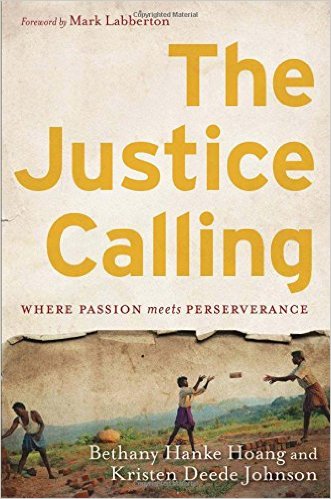 The Justice Calling: Where Passion Meets Perseverance Bethany Hanke Hoang & Kristen Deede Johnson (Brazos Press) $19.99 We helped launch this extraordinary book at Jubilee 2016 last year in Pittsburgh and here is some of what I wrote in one of my discussions of it: “…both women are exceptionally well-schooled and committed to educating for lasting, formational transformation in readers so that we might be the kind of people who are empowered to be healthy activists in church and world. They understand the big flow of the Scriptures, the story, as we say, and place God’s relentless call to do justice in that context.” Andy Crouch has called it “a deep, wide, wise contribution to a truly comprehensive Christian understanding of Justice” and says, “I can’t imagine a better biblical and theological introduction to the topic of justice.” In a year with a handful of very good social justice resources that stand out, this is rises above them all, a must read, beautiful, very insightful and important book of truly lasting significance.
The Justice Calling: Where Passion Meets Perseverance Bethany Hanke Hoang & Kristen Deede Johnson (Brazos Press) $19.99 We helped launch this extraordinary book at Jubilee 2016 last year in Pittsburgh and here is some of what I wrote in one of my discussions of it: “…both women are exceptionally well-schooled and committed to educating for lasting, formational transformation in readers so that we might be the kind of people who are empowered to be healthy activists in church and world. They understand the big flow of the Scriptures, the story, as we say, and place God’s relentless call to do justice in that context.” Andy Crouch has called it “a deep, wide, wise contribution to a truly comprehensive Christian understanding of Justice” and says, “I can’t imagine a better biblical and theological introduction to the topic of justice.” In a year with a handful of very good social justice resources that stand out, this is rises above them all, a must read, beautiful, very insightful and important book of truly lasting significance.
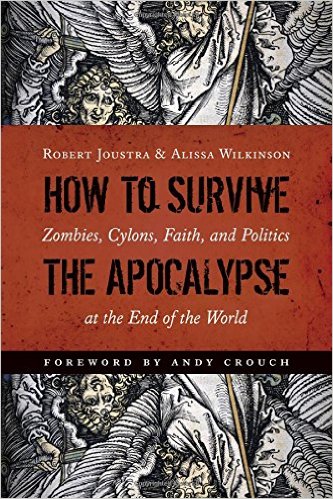 How to Survive the Apocalypse: Zombies, Cylons, Faith and Politics at the End of the World Robert Joustra & Alissa Wilkinson (Eerdmans) $16.00 Of the many, many intriguing books that offer uniquely Christian cultural criticism this year, this is the most audacious, the most fascinating and — for those who like to read seriously thoughtful stuff written about fun stuff — best book of its kind in years. I’ve recommended it almost everywhere I’ve gone this year and wrote about it more than once. I recommended it in a book list I wrote for a column for the Center for Public Justice this summer, and wrote this: This new book by Wilkinson, a respected film critic for Christianity Today and Joustra, a professor of international studies at Redeemer University in Ontario, is a blast. It offers a great overview of recent themes in popular culture, from The Walking Dead to Game of Thrones to House of Cards, and yet it is serious-minded, drawing significantly on Charles Taylor and his analysis of the malaise of secular modernity. Its basic premise is this: in a culture where our best storytellers and artists are telling us that things are falling apart and that there is no hope, how do we act in the public square for the common good as people of hope? What do dystopian narratives tell us about our culture’s worldview and how do we live well in such anxiety-laden political terrain? Indeed, this is serious business, and yet, as Michael Wear says on the back, “Who said the apocalypse couldn’t be fun?” Zombie plots, Battlestar Galactica, Scandal and the work of being Christian citizens? Yes, yes indeed.
How to Survive the Apocalypse: Zombies, Cylons, Faith and Politics at the End of the World Robert Joustra & Alissa Wilkinson (Eerdmans) $16.00 Of the many, many intriguing books that offer uniquely Christian cultural criticism this year, this is the most audacious, the most fascinating and — for those who like to read seriously thoughtful stuff written about fun stuff — best book of its kind in years. I’ve recommended it almost everywhere I’ve gone this year and wrote about it more than once. I recommended it in a book list I wrote for a column for the Center for Public Justice this summer, and wrote this: This new book by Wilkinson, a respected film critic for Christianity Today and Joustra, a professor of international studies at Redeemer University in Ontario, is a blast. It offers a great overview of recent themes in popular culture, from The Walking Dead to Game of Thrones to House of Cards, and yet it is serious-minded, drawing significantly on Charles Taylor and his analysis of the malaise of secular modernity. Its basic premise is this: in a culture where our best storytellers and artists are telling us that things are falling apart and that there is no hope, how do we act in the public square for the common good as people of hope? What do dystopian narratives tell us about our culture’s worldview and how do we live well in such anxiety-laden political terrain? Indeed, this is serious business, and yet, as Michael Wear says on the back, “Who said the apocalypse couldn’t be fun?” Zombie plots, Battlestar Galactica, Scandal and the work of being Christian citizens? Yes, yes indeed.
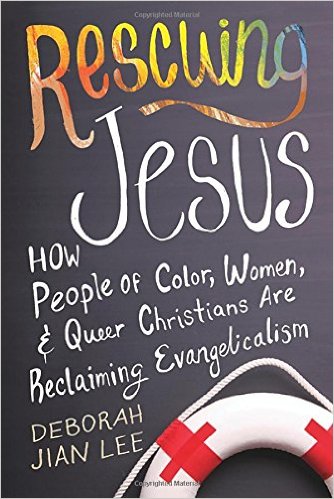 Rescuing Jesus: How People of Color, Women, & Queer Christians Are Reclaiming Evangelicalism Deborah Jian Lee (Beacon Press) $26.95 I suspect that naming this one of the best books of the year will annoy many and I understand that it moves in a direction that will be offensive, even, to some. It could be argued that it ought to be read by those who have a visceral reaction to a call to be more attentive to the changes happening within evangelicalism, and perhaps to be more inclusive to those who have been marginalized and hurt. Whether you are drawn to this topic or not, this is a book that is informative and will offer a behind the scenes look at how these hot topic issues (and, more, the people involved) are changing para-church groups, evangelical college campuses, mega-churches and their leaders, the publishing world and more. The book is exceptionally well researched and very well told as it follows a select handful of persons through their time within the evangelical movement; some remain intense followers of Christ within a broad evangelical tradition while others no longer find themselves affiliated with evangelical faith; a few no longer see themselves as Christians.
Rescuing Jesus: How People of Color, Women, & Queer Christians Are Reclaiming Evangelicalism Deborah Jian Lee (Beacon Press) $26.95 I suspect that naming this one of the best books of the year will annoy many and I understand that it moves in a direction that will be offensive, even, to some. It could be argued that it ought to be read by those who have a visceral reaction to a call to be more attentive to the changes happening within evangelicalism, and perhaps to be more inclusive to those who have been marginalized and hurt. Whether you are drawn to this topic or not, this is a book that is informative and will offer a behind the scenes look at how these hot topic issues (and, more, the people involved) are changing para-church groups, evangelical college campuses, mega-churches and their leaders, the publishing world and more. The book is exceptionally well researched and very well told as it follows a select handful of persons through their time within the evangelical movement; some remain intense followers of Christ within a broad evangelical tradition while others no longer find themselves affiliated with evangelical faith; a few no longer see themselves as Christians.
The author herself, Deborah Jian Lee, is not a neutral observer but a former evangelical who moved somewhat into the progressive faith camp and ended up (or so I gather) no longer a Christian at all. Yet, she wants the stories of these folks told and wants to use their experiences — for better or worse — as not only case studies but as bell weather pointers to things that have changed and are changing within the broad religious landscape of our culture.
A quick admission: I was one of the people who the author interviewed in her writing of this big book and I spent an hour with her one afternoon three years ago. She attended the CCO’s Jubilee conference once, too, and talks about it candidly. Our good friend Lisa Sharon Harper — whose own The Very Good Gospel also is on our list of Best Books of 2016 — is one of the persons whose story is told by Ms Lee and it is remarkable to hear some of the backstory of Lisa’s life during her college years. (Lisa is both African American and obviously a woman and her being kicked off the leadership team of a college fellowship group and even out of a prayer meeting she herself started because she was a woman is told painfully.) She is not the only friend of ours interviewed or mentioned in Rescuing Jesus so I care about this book a lot. I cried through some of it and found it hard to put down.
There are amazing stories in Rescuing Jesus, good journalistic reporting, helpful framing of contemporary concerns by explaining past controversies; within the evangelical feminist movement, for instance ( see explains the group Daughter of Sarah’s struggles about gay rights and abortion which led to a painful splintering and eventual formation of a more conventionally evangelical feminist organization.) She explores how many social justice causes did or didn’t get discussed within the national leadership of well known evangelical groups and ministries. I found the long section on the Queer Underground (as they called themselves) within the strictly conservative Biola University to be particularly riveting; no book I know has told this kind of story in this way before and it deserves credit for bringing these individuals and their stories to us.
Many thoughtful and caring Christian leaders do not think all these changes in attitude and practice are for the better; some are, for instance, glad about increased emphasis on racial and multi-ethnic diversity but disapprove of full equality for GLTBQ Christians. Regardless of one‘s views, and whether one has a stake in evangelicalism, as such, or not, this is an important book about people’s lives, about religion in our time, about institutional change, and we are glad to honor it as one of the important books of 2016.
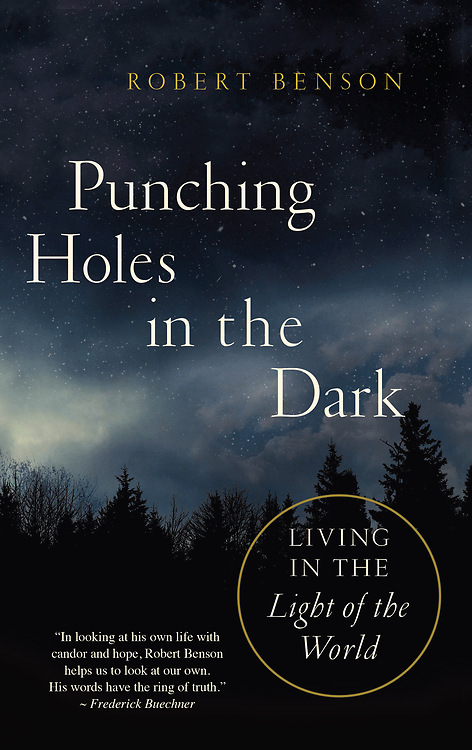 Punching Holes in the Dark: Living in the Light of the World Robert Benson (Abingdon) $16.99 I do not think I have read a Robert Benson book that I was not sad to see end — surely the mark of a good book is when you want more words, more pages, more chapters. And, oh how I felt this way with Benson’s Punching Holes in the Dark… I said out loud to nearly anyone around me when I was reading this last summer that I didn’t want this book to end. Benson is a charming, enchanted writer with a style I cannot describe. He has an economy of words and is clear as a bell, even though his content is mature and thoughtful and deeply wise. He has funny stories — a few I’ve read out loud at workshops — and he has tender tales and you will simply have to take this up yourself to see if he resonates with you has he does with so many of his appreciative fans. One of whom happens to be Frederick Buechner, by the way, who has a rare blurb on the front of the book, noting its “candor and hope.”
Punching Holes in the Dark: Living in the Light of the World Robert Benson (Abingdon) $16.99 I do not think I have read a Robert Benson book that I was not sad to see end — surely the mark of a good book is when you want more words, more pages, more chapters. And, oh how I felt this way with Benson’s Punching Holes in the Dark… I said out loud to nearly anyone around me when I was reading this last summer that I didn’t want this book to end. Benson is a charming, enchanted writer with a style I cannot describe. He has an economy of words and is clear as a bell, even though his content is mature and thoughtful and deeply wise. He has funny stories — a few I’ve read out loud at workshops — and he has tender tales and you will simply have to take this up yourself to see if he resonates with you has he does with so many of his appreciative fans. One of whom happens to be Frederick Buechner, by the way, who has a rare blurb on the front of the book, noting its “candor and hope.”
I suppose this is a book about spiritual formation — Benson is, after all, a contemplative and retreat leader and is an adjunct faculty member for the Academy of Spiritual Formation and has several classic books on prayer. But like his book on baseball or the one on writing or the one about gardening on the one on Benedictine views of neighborliness or classic about hope (Between the Dreaming and the Coming True) his gentle spiritual tone spills out into quite ordinary life. He writes about growing up in a colorfully evangelical home, he writes about his involvement in an odd guys film club, he writes about food and faith and work and being an introvert. He writes about various kinds of worshipping communities, comparing them graciously to his own preferred Episcopalian style. He isn’t overstated and never violent but he does get around to talking about what it means to punch holes in the darkness, letting a little light, and a little of The Light, shine through.
As Eugene Peterson puts it “Robert Benson doesn’t exactly tell us how to do it but he does tell an honest story about the ways that Jesus’ prayer is getting worked out in his own life.” Without a doubt one of the books I most enjoyed this year.
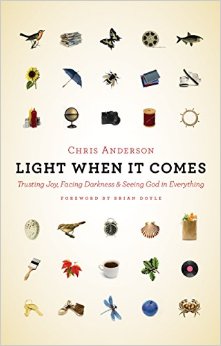 Light When It Comes: Trusting Joy, Facing Darkness & Seeing God in Everything Chris Anderson (Eerdmans) $16.99 It is hard to explain the charm and value of this wonderful collection of short essays. It is pitched as a book that helps us “see God in everything” and you may recall a list I wrote not long ago at our BookNotes newsletter that listed 15 such books, all older. This new one could easily have been added to such a list but it isn’t exactly what I’d call “spirituality.” It is less about the God encounter in the quotidian, but about the goodness of the experiences of life itself. Yes, yes, God is there; revelation happens as we come to see the Light. But, again, these are stories and ruminations on life, episodes and glorious snatches of God-light in the realness of daily living. This guy is a great writer and a good observer. I love these kinds of collections of essays and want to honor it as the best of its class.
Light When It Comes: Trusting Joy, Facing Darkness & Seeing God in Everything Chris Anderson (Eerdmans) $16.99 It is hard to explain the charm and value of this wonderful collection of short essays. It is pitched as a book that helps us “see God in everything” and you may recall a list I wrote not long ago at our BookNotes newsletter that listed 15 such books, all older. This new one could easily have been added to such a list but it isn’t exactly what I’d call “spirituality.” It is less about the God encounter in the quotidian, but about the goodness of the experiences of life itself. Yes, yes, God is there; revelation happens as we come to see the Light. But, again, these are stories and ruminations on life, episodes and glorious snatches of God-light in the realness of daily living. This guy is a great writer and a good observer. I love these kinds of collections of essays and want to honor it as the best of its class.
One of the great spiritual writers of this sort, himself a poet, is Brian Doyle, who has a rave comment on the back. So does the spiritual writer Paula Huston who calls is “a literary gem and a cup of blessing.”
But what most attracted me to this small paperback is the rare endorsement from one of my all–time favorite writers, the undertaker Thomas Lynch, who says of it:
An age that has fashioned faith into bludgeon and cudgel, and traded community for self-righteous indignation, might better be illumined by Light When It Comes and by the grace of Anderson’s vital, studious witness. The ties of belief that bind us, each to the other, needn’t be rope enough to hang, cruel lash or rein or tether. Rather, lifeline, safe mooring, the holy, miraculous lowering of our hobbled, heart-wrecked selves to the place of our redeeming.
If I were giving an award for the best back cover blurb, I’d nominate those three poetic sentences right there. Wow. If Lynch recommends it, you should read it.
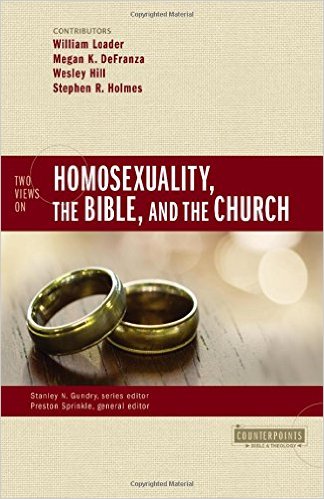 Two Views on Homosexuality, The Bible, and the Church General Editor, Preston Sprinkle (Zondervan) $16.99 We often recommend the many, many books in the Zondervan Counterpoint series and for obvious reasons we have needed a book like this for decades. I have read for decades almost everything I can get my hands on studying this topic and there are oodles of books that bring all sorts of perspectives and orientations. No book heretofore has attempted what this brave paperback does: it offers two evangelical scholars who hold to the conventional, orthodox view that same sex erotic relationships are forbidden by Scripture and two that suggest otherwise. I know of only one good book that shows “both sides” pro and con around the exegesis of the Bible and, to be honest, for a variety of reasons, it hasn’t been that helpful. Here we have four scholars who all agree with the most fundamental assumption that the Bible is God’s inspired and authoritative word and that our practices must be informed by careful study of the truest meaning of the Bible itself. The two that oppose same sex relationships are gracious and candid and bring two slightly different views to the conversation; the two that are supportive of inclusion and marriage equality do so for slightly different theological reasons. As with others in this large series of books, after each chapter the other three participants offer critique. So by the end of the book readers have engaged not only four distinctive positions but have seen the rebuttals and responses from the others.
Two Views on Homosexuality, The Bible, and the Church General Editor, Preston Sprinkle (Zondervan) $16.99 We often recommend the many, many books in the Zondervan Counterpoint series and for obvious reasons we have needed a book like this for decades. I have read for decades almost everything I can get my hands on studying this topic and there are oodles of books that bring all sorts of perspectives and orientations. No book heretofore has attempted what this brave paperback does: it offers two evangelical scholars who hold to the conventional, orthodox view that same sex erotic relationships are forbidden by Scripture and two that suggest otherwise. I know of only one good book that shows “both sides” pro and con around the exegesis of the Bible and, to be honest, for a variety of reasons, it hasn’t been that helpful. Here we have four scholars who all agree with the most fundamental assumption that the Bible is God’s inspired and authoritative word and that our practices must be informed by careful study of the truest meaning of the Bible itself. The two that oppose same sex relationships are gracious and candid and bring two slightly different views to the conversation; the two that are supportive of inclusion and marriage equality do so for slightly different theological reasons. As with others in this large series of books, after each chapter the other three participants offer critique. So by the end of the book readers have engaged not only four distinctive positions but have seen the rebuttals and responses from the others.
The editor of the project, Preston Sprinkle (who himself has a book offering a conventional view called People to Be Loved: Why Homosexuality Is Not Just an Issue), weighs in with some summarizing and evaluation.
The four esteemed scholars who are contributors to this important volume, by the way, are William Loader, Megan K. Defranza, Wesley Hill and Stephen R. Holmes. I’m grateful for their own courage and candor in entering this debate with grace and openness, knowing that all of us are leaning in over their shoulders.
By the way, I am pretty sure that Zondervan — a premier conservative evangelical publishing house — will take some heat for daring to even host this conversation. Interestingly, I suspect that few object to their doing books like this on other controversial topics from the excellent one on church/state relations to differing views of hell or the end times to questions about how to understand the doctrine of inerrency to the question of woman’s ordination to a fascinatingly feisty one on how evangelicals and the Orthodox should relate, and so many more. But this one on homosexuality — look out; some don’t even want to talk about this, let alone admit that the translation, meaning and interpretation of the most obvious relevant Biblical texts are themselves contested. We here at Hearts & Minds applaud Zondervan’s efforts at helping us think things through with reputable Biblical thinkers in serious discussion, on this topic and the others. Kudos to the senior editor of this large Counterpoint series, the respected Stanley Gundry.
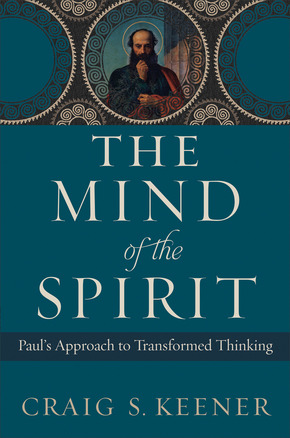 The Mind of the Spirit: Paul’s Approach to Transformed Thinking Craig Keener (Baker Academic) $32.99 There are many, many academic books that deserve honorable mention and so many that, although I haven’t read them, they seem just spectacular. As you know, I’m a sucker for good blurbs and I take seriously the recommendations of scholars I respect. Although he have a lot of Biblical studies that are scholarly in nature, and many have gotten great reviews this year, I want to hold up this one at least. It is a rare combination of scholarly rigor and yet aimed at a subject that should affect us all — nurturing the “mind of Christ.” If you are among the many who regularly reflect on the implications of Romans 12: 1-2 — and most book lovers, do, realizing as we do that books are tools for life long learning — then this book on how Paul envisions the transformed mind will certainly attract your interest.
The Mind of the Spirit: Paul’s Approach to Transformed Thinking Craig Keener (Baker Academic) $32.99 There are many, many academic books that deserve honorable mention and so many that, although I haven’t read them, they seem just spectacular. As you know, I’m a sucker for good blurbs and I take seriously the recommendations of scholars I respect. Although he have a lot of Biblical studies that are scholarly in nature, and many have gotten great reviews this year, I want to hold up this one at least. It is a rare combination of scholarly rigor and yet aimed at a subject that should affect us all — nurturing the “mind of Christ.” If you are among the many who regularly reflect on the implications of Romans 12: 1-2 — and most book lovers, do, realizing as we do that books are tools for life long learning — then this book on how Paul envisions the transformed mind will certainly attract your interest.
Maybe you recall that a few weeks ago I gave a bit of a promotion to the autobiography that Keener wrote with his wife, who is African. It is a very moving story and is both tender and courageous. This is the other side of Keener, who is an exceptionally rigorous scholar — there are more foonotes in here than you can imagine! He is fluent in ancient languages, Greco-Roman culture, and the cultural background of epistle writing in the age of the early church and is known for his dictionaries of cultural background information. If anybody can help us figure out the cultural issues around Paul’s thinking, Keener can. And if anybody has the learned zeal to help us embrace such a project — a transformed mind so we think as God wants, even about the issues of the day — again, Professor Keener can. Before the end material this heady book is about 350 pages, so it isn’t as mammoth as it might have been.
Blurbs on the back are from a scholar from Yale Divinity School, from James Dunn of Durham, from Michael Bird the esteemed Biblical scholar from Ridley College in Melbourne, Australia. I like the lines from the very widely read Paul scholar Michael Gorman of the Ecumenical Institute at St. Mary’s Seminary and University in Baltimore, who notes that “Keener has filled a significant gap in Pauline studies as only he could do…”
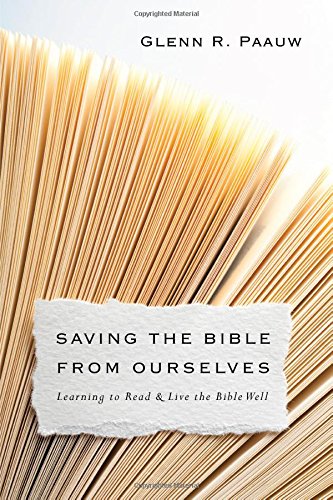 Saving The Bible From Ourselves: Learning to Read & Live the Bible Well Glenn R. Paauw (IVP) $18.00 I so appreciated this book and it serves in many was as a quintessential Hearts & Minds sort of book — thoughtful but not arcane, open-minded but well grounded in orthodoxy, eager to help us live faith in our twenty-first century context. It provocatively (or playfully) asks “Does the Bible Need To Be Saved?” Well, maybe it does — from us! That is, over the course of the centuries, Bible scholars and publishers have increasingly added helps — all kinds of stuff to help us make the Bible easier to understand. But maybe we really don’t read the Bible much anymore; that is, we study and tear apart the text, forcing verses into our per-conceived categories or domesticating them into our churchy sensibilities. Paauw wisely opts to reject “narrow, individualistic and escapist views of salvation” based on unhelpful assumptions about the Bible and how we read it. He offers, instead, what he calls “big readings.”
Saving The Bible From Ourselves: Learning to Read & Live the Bible Well Glenn R. Paauw (IVP) $18.00 I so appreciated this book and it serves in many was as a quintessential Hearts & Minds sort of book — thoughtful but not arcane, open-minded but well grounded in orthodoxy, eager to help us live faith in our twenty-first century context. It provocatively (or playfully) asks “Does the Bible Need To Be Saved?” Well, maybe it does — from us! That is, over the course of the centuries, Bible scholars and publishers have increasingly added helps — all kinds of stuff to help us make the Bible easier to understand. But maybe we really don’t read the Bible much anymore; that is, we study and tear apart the text, forcing verses into our per-conceived categories or domesticating them into our churchy sensibilities. Paauw wisely opts to reject “narrow, individualistic and escapist views of salvation” based on unhelpful assumptions about the Bible and how we read it. He offers, instead, what he calls “big readings.”
And then it really gets good — he offers seven understandings (that may feel “new” to some, but are in fact fairly ancient) of the Bible as “steps on the path to recovering one deeply engaged Bible. His new-sounding understandings are, in fact alternatives to deficiencies. And in naming these oddball ways we (mis) understand and misread the Bible he is brilliant.
Paauw offers here 7 “kinds” or sorts of
ways we think of the Bible, and counters each with a more faithful
sort. (For instance, in contrast to our presumption that the Bible is
essentially “complicated” he unveils the “elegant Bible.” Instead of a
“snacking” Bible he invites us to “savor the feasting Bible.” He says we
need saved from “my private Bible” and speaks of “sharing our synagogue
Bible.” Of course, instead of “our otherworldly Bible” he says we are
to be “grounded in the Earthly Bible.” On great problem, “our
de-dramatized Bible” takes two sections to refute. He shows how we can
“rediscover the stroiented Bible” and then shows how we must “preform
the stroiented Bible.” There’s more and it is rich, solid, creative,
helpful stuff. Blurbs on the back are long and rich themselves, by
Walter Brueggemann and Mark Noll, who both commend it earnestly. This is deserving of being on any good list of the best books of the year.
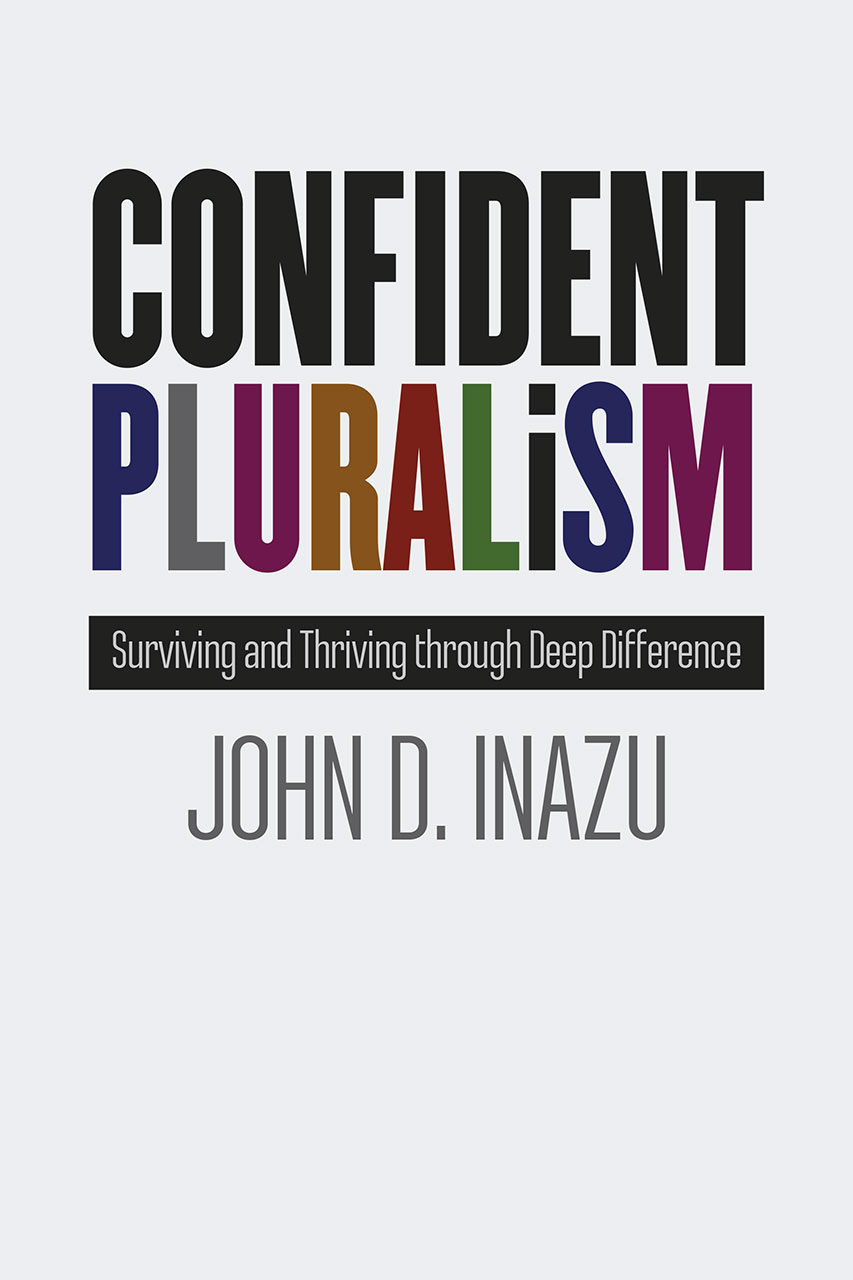 Confident Pluralism: Surviving and Thriving Through Deep Difference John D. Inazu (University of Chicago Press) $29.99 We usually name a few books that are scholarly in nature and this, obviously, is published by one of the most esteemed academic presses in the world. Yet, it isn’t dry or dusty nor it it primarily written for the scholarly guild. This is a book for nearly all citizens who want to get beyond the simple call to civility and to probe more deeply about how the structures of our society could enhance greater diversity, making room for faith-based differences even in how the government funds programming and more. I’ve read a lot in these related fields — personal civility, conflict resolution, and questions of religious liberty and such. Insights from those who study civil society, the role of mediating structures and such will be glad for his appreciation of a multi-dimensional view of society. (That is, society is more than just government and individuals and the questions for public philosophy need to be more than whether we want big government or small government.) Yet, how do we get along when our fundamental vision of the meaning of government and the direction of social institutions are so very contested?
Confident Pluralism: Surviving and Thriving Through Deep Difference John D. Inazu (University of Chicago Press) $29.99 We usually name a few books that are scholarly in nature and this, obviously, is published by one of the most esteemed academic presses in the world. Yet, it isn’t dry or dusty nor it it primarily written for the scholarly guild. This is a book for nearly all citizens who want to get beyond the simple call to civility and to probe more deeply about how the structures of our society could enhance greater diversity, making room for faith-based differences even in how the government funds programming and more. I’ve read a lot in these related fields — personal civility, conflict resolution, and questions of religious liberty and such. Insights from those who study civil society, the role of mediating structures and such will be glad for his appreciation of a multi-dimensional view of society. (That is, society is more than just government and individuals and the questions for public philosophy need to be more than whether we want big government or small government.) Yet, how do we get along when our fundamental vision of the meaning of government and the direction of social institutions are so very contested?
This is a book celebrating this bold, American project — e pluribus unum. Yes, it has some political philosophy and some semi-scholarly studies of social structures and how to shore up faltering institutions. But it also has lovely guidance about conflict, diversity, getting along with others — thriving, as he says, through deep differences. This is a great, thoughtful book published by an esteemed legal scholar and old acquaintance of Hearts & Minds. We are honored to name this as one of the most important books of 2016.
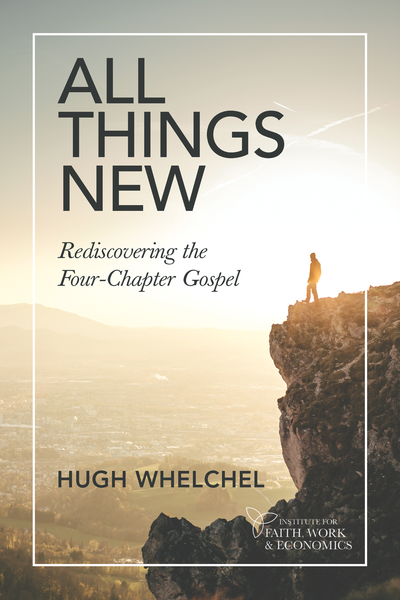 All Things New: Rediscovering the Four Chapter Gospel Hugh Whelchel (Institute for Faith, Work & Economics) $8.00 I don’t need to say much about this except this over the top exclamation (that I have been made repeatedly since I saw this remarkable Bible study resource) — this is the best small group Bible study I’ve seen on this kind of topic and one that many of us have longed for, literally, for decades! (As a matter of fact, I had considered trying my hand at doing this kind of a small group study, realizing the big hole in the market for Bible study on this topic.) All Things New is an absolutely must-use, big-picture small group discussion guide that I believe will be transformative for many who use it. We have a lot of great small group Bible study books and discussion resources but there is simply nothing like this in print!
All Things New: Rediscovering the Four Chapter Gospel Hugh Whelchel (Institute for Faith, Work & Economics) $8.00 I don’t need to say much about this except this over the top exclamation (that I have been made repeatedly since I saw this remarkable Bible study resource) — this is the best small group Bible study I’ve seen on this kind of topic and one that many of us have longed for, literally, for decades! (As a matter of fact, I had considered trying my hand at doing this kind of a small group study, realizing the big hole in the market for Bible study on this topic.) All Things New is an absolutely must-use, big-picture small group discussion guide that I believe will be transformative for many who use it. We have a lot of great small group Bible study books and discussion resources but there is simply nothing like this in print!
You may know that many authors (and we here) have talked about a “four chapter” understanding of the gospel — creation, fall, redemption, restoration — in contrast to the more conventional “two chapter” story that says only that we are sinners who are saved, drawing on the two center chapters of the unfolding Bible drama, fall and redemption. But where and in what place are we saved, and to what ends? If we don’t know the goodness of creation (and all that implies about work and culture) and the hope of a future restoration of all things, then the gospel is truncated, cut down, reduced. The gospel is more than “I need God and God loves me” or “Jesus died for your sins” or “I’m in deep need and God and the church can provide true meaning” even though those truths are true enough. This small group Bible study walks us quickly through this endlessly fascinating fuller, truer telling of the Bible story — from good creation through the disastrous distortions in every square inch of life caused by sin and idolatry to the blood bought salvation experienced by the death and resurrection of Jesus to how to live out the hope of the Kingdom coming, now and not yet. There are two final sessions, why the “two chapter” telling of the gospel story is inadequate and how the full vision of all of life being redeemed matters for our lives, including our public lives and our sense of work and calling.
Many, many kudos to Hugh Whelchel for writing and publishing this study that is going to be a life-line to many, a clear and basic Bible basis for a fuller understanding of God’s purposes in our lives and in our times.
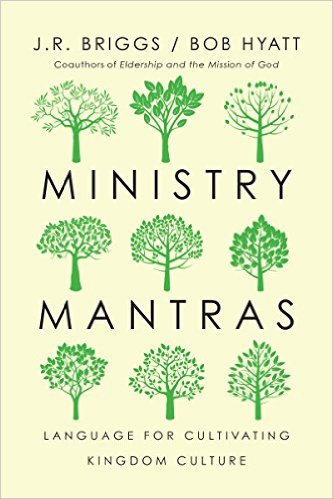 Ministry Mantras: Language for Cultivating Kingdom Culture J.R. Briggs & Bob Hyatt (IVP) $17.00 This was a hard call to make as we have so many great, useful, inspiring, helpful books about congregational life and church renewal that it is hard to pick just one to highlight. There are many books about parish life and several that we sold well at church events written for leaders and pastors. This one, though, is by an author I really, really like, a man I esteem greatly, and has a rather unique formate which sets it apart as interesting and easy to read . And — believe me — readers get a lot for their investment here as there is tons of information, insight, inspiration in Ministry Mantras. It deserves to be touted as one of the very best books of the year and my pick for my favorite book in the area of congregational life and church leadership. It’s a great, fun read!
Ministry Mantras: Language for Cultivating Kingdom Culture J.R. Briggs & Bob Hyatt (IVP) $17.00 This was a hard call to make as we have so many great, useful, inspiring, helpful books about congregational life and church renewal that it is hard to pick just one to highlight. There are many books about parish life and several that we sold well at church events written for leaders and pastors. This one, though, is by an author I really, really like, a man I esteem greatly, and has a rather unique formate which sets it apart as interesting and easy to read . And — believe me — readers get a lot for their investment here as there is tons of information, insight, inspiration in Ministry Mantras. It deserves to be touted as one of the very best books of the year and my pick for my favorite book in the area of congregational life and church leadership. It’s a great, fun read!
Here’s the gist: Ministry Mantas is just that, a collection of “mantras” or slogans to say and lives. I think this is nearly brilliant and am surprised it hasn’t been done before. In a way it gets us to best practices, good stuff that makes a difference, but it gets there by way of these battle cries, heart sayings, ministry mantras. These are not cliches but truly insightful sayings that will stick with you and your team, you and your church.
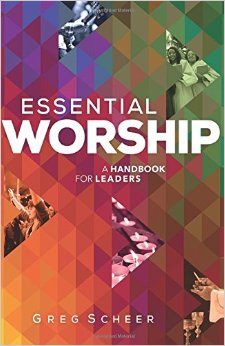 Essential Worship: A Handbook for Leaders Greg Scheer (Baker Books) $19.99 There are bunches of books about worship and, I am convinced, many are very important. We’ve seen some excellent ones this year but if I were to choose just one to commend, this would be it. We just cannot stop learning about how to worship well, what that means and could mean, and how to improve our liturgical practices. I hope this gets a wide readership. Greg Scheer is involved a bit in the Calvin Institute for Christian Worship which itself is legendary and greatly appreciated by folks across the theological and liturgical spectrum; he himself serves a liturgically, aesthetically and missionally aware CRC church in Grand Rapids and this book emerges from his decades of serving the gathered people of God. (He has worked in a Southern evangelical church, a mainline Presbyterian congregation, and this large, lively CRC parish.)
Essential Worship: A Handbook for Leaders Greg Scheer (Baker Books) $19.99 There are bunches of books about worship and, I am convinced, many are very important. We’ve seen some excellent ones this year but if I were to choose just one to commend, this would be it. We just cannot stop learning about how to worship well, what that means and could mean, and how to improve our liturgical practices. I hope this gets a wide readership. Greg Scheer is involved a bit in the Calvin Institute for Christian Worship which itself is legendary and greatly appreciated by folks across the theological and liturgical spectrum; he himself serves a liturgically, aesthetically and missionally aware CRC church in Grand Rapids and this book emerges from his decades of serving the gathered people of God. (He has worked in a Southern evangelical church, a mainline Presbyterian congregation, and this large, lively CRC parish.)
I hope you recall our previous review of Essential Worship: A Handbook explaining it’s wide vision, making it helpful for those just starting to think about worship leading or those who have been pastors or church organists for decades. Highly recommended.
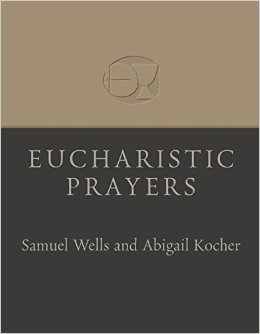 Eucharistic Prayers Samuel Wells & Abigail Kocher (Eerdmans) $40.00 We have many books of prayers. Some are designed for personal use — think Valley of Vision, for instance or the two evocative ones by Walter Brueggemann (Awed to Heaven, Rooted in Earth and Prayers for a Privileged People) or the wonderful classic A Diary of Private Prayer by John Baillie. We remain fond of the big one put together by Shane Claiborne, Jonathan Wilson-Hartgrove and Enuma Okoro called Common Prayer: A Liturgy for Ordinary Radicals that can also be used communally for worship.
Eucharistic Prayers Samuel Wells & Abigail Kocher (Eerdmans) $40.00 We have many books of prayers. Some are designed for personal use — think Valley of Vision, for instance or the two evocative ones by Walter Brueggemann (Awed to Heaven, Rooted in Earth and Prayers for a Privileged People) or the wonderful classic A Diary of Private Prayer by John Baillie. We remain fond of the big one put together by Shane Claiborne, Jonathan Wilson-Hartgrove and Enuma Okoro called Common Prayer: A Liturgy for Ordinary Radicals that can also be used communally for worship.
And then there are books of prayers that are specifically designed to be used in public worship. Some are geared to the lectionary, others not. For mainline churches that follow the lectionary we’re fond of the two volumes (for each of three years) of Feasting on the Word Worship Companion. There are many such worship planning resources. Some, frankly, can be a bit stuffy while many these days are nearly flakey. To find eloquent and charm, clarity and theological substance in real prayers to be used in real services is quite an art and when we find one of this sort of substance and beauty we want to celebrate it loudly. To get theologians and church leaders like Wells and Kocher working on this project and then to present their good, spirited words in such a handsome, slightly larger hardback, is a true gift. If you want more than their prayers for the Great Thanksgiving, you can see their thinking about prayer during worship called Shaping the Prayers of the People: The Art of Intercession which is very thoughtful. Thanks to Eerdmans for offering Eucharistic Prayers, a truly great liturgical resource volume, one of the best of its kind this year.
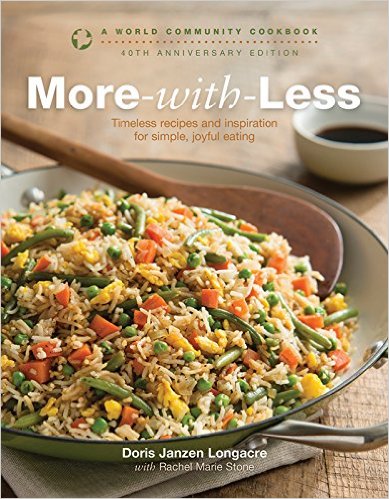 More with Less Cookbook 40th Anniversary Edition Doris Longacre (Herald Press) $22.00 “A World Community Cookbook” with Rachel Stone We recommended this last month in a BookNotes post about various sorts of books that make great gifts. We noted that “we have stocked this marvelous Mennonite cookbook since the day we opened and Beth and I have given quite a few away over the years — it remains a wonderful, wonderful gift, a great cookbook to use (even for those who aren’t advanced or skilled) made all the better in this very handsome, very new, 40th anniversary edition. Earlier editions have sold over 1 million copies! We enjoy all three in the “World Community Cookbook” series — More-With-Less, Simply in Season, and Extending the Table, but More-with-Less remains the classic.” It uses simple, natural ingredients, offers a gentle sense that we can be better stewards of the gifts of creation (and our family budgets) by spending less and being joyful extravagant in ways that are simple and cheaper. In this new edition there’s some updated recipes, some great new essays, wonderful full color design and pictures. Some may still want the older spiral bound edition but this new one has a “lay flat” binding that promises to be useful in the kitchen.
More with Less Cookbook 40th Anniversary Edition Doris Longacre (Herald Press) $22.00 “A World Community Cookbook” with Rachel Stone We recommended this last month in a BookNotes post about various sorts of books that make great gifts. We noted that “we have stocked this marvelous Mennonite cookbook since the day we opened and Beth and I have given quite a few away over the years — it remains a wonderful, wonderful gift, a great cookbook to use (even for those who aren’t advanced or skilled) made all the better in this very handsome, very new, 40th anniversary edition. Earlier editions have sold over 1 million copies! We enjoy all three in the “World Community Cookbook” series — More-With-Less, Simply in Season, and Extending the Table, but More-with-Less remains the classic.” It uses simple, natural ingredients, offers a gentle sense that we can be better stewards of the gifts of creation (and our family budgets) by spending less and being joyful extravagant in ways that are simple and cheaper. In this new edition there’s some updated recipes, some great new essays, wonderful full color design and pictures. Some may still want the older spiral bound edition but this new one has a “lay flat” binding that promises to be useful in the kitchen.
The art and design of beautiful looking cookbooks these days is a joy to behold and when you combine this healthy, justice-oriented, simple-living vision with such a vivid, pleasing, design, and — most importantly — delicious recipes. you know you’ve got a winner. This new version of a Hearts & Minds classic deserves a very honorable mention.
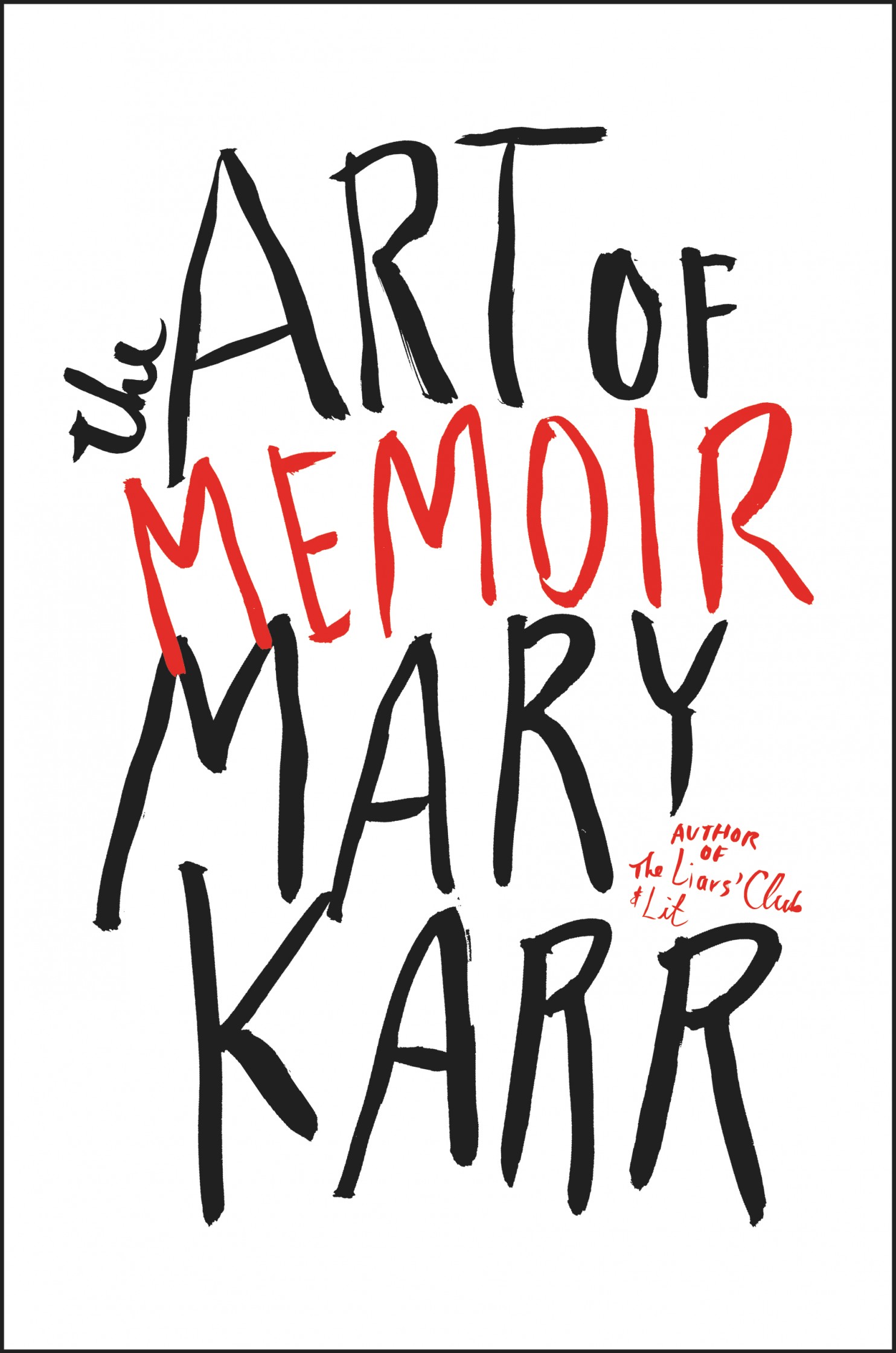 Art of Memoir Mary Karr (Harper) $24.99 I hope you recall our announcing this — both a good guide to being a writer, the art of doing memoir, and a bit of a continuation of her story, told so well in Liar’s Club, Cherry, and Lit — some of the most memorable memoirs of our generation. If anyone can tell us how it’s done, Karr is it. Technically, this came out in ’15 but I wanted to list it as a new paperback — and one I didn’t read until 2016. If you’ve been undecided, maybe this will help:
Art of Memoir Mary Karr (Harper) $24.99 I hope you recall our announcing this — both a good guide to being a writer, the art of doing memoir, and a bit of a continuation of her story, told so well in Liar’s Club, Cherry, and Lit — some of the most memorable memoirs of our generation. If anyone can tell us how it’s done, Karr is it. Technically, this came out in ’15 but I wanted to list it as a new paperback — and one I didn’t read until 2016. If you’ve been undecided, maybe this will help:
Mary Karr has written another astonishingly perceptive, wildly entertaining, and profoundly honest book-funny, fascinating, necessary. The Art of Memoir will be the definitive book on reading and writing memoir for years to come. — Cheryl Strayed
Karr is a national treasure that rare genius who s also a brilliant teacher. This joyful celebration of memoir packs transcendent insights with trademark hilarity. Anyone yearning to write will be inspired, and anyone passionate to live an examined life will fall in love with language and literature all over again. — George Saunders
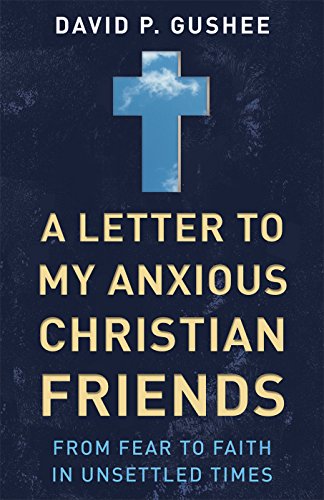 A Letter to My Anxious Christian Friends: From Fear to Faith in Unsettled Times David Gushee (Westminster/John Knox Press) $15.00 This book deserves to be noted and I think it has much usefulness, even now. It came out long before the election, but captured something brewing for years, now, coming to a head in this season — namely, that many good Christian folks are fearful that things are coming undone. Many of us are anxious, not just about Trump (that’s another story) but about the larger trends in our culture, the shifts in church life, the changes in thinking about sexuality and the changes in the conversations about that; we are concerned about pop culture, about guns and immigration and poverty; we are nervous about foreign affairs, about ISIS and more. We are wondering about doctrine and the Bible and God and the future of our churches. Much of our anxiety revolves around the lack of civility in our civic discourse and the polarization that seems as bad as ever. What even is America (a Christian country, or no?) Who are we, what should we make of the political parties and our apparently deepening fractures? What is a reasonable, Christian view about these concerns, these “unsettled times” and about our fears?
A Letter to My Anxious Christian Friends: From Fear to Faith in Unsettled Times David Gushee (Westminster/John Knox Press) $15.00 This book deserves to be noted and I think it has much usefulness, even now. It came out long before the election, but captured something brewing for years, now, coming to a head in this season — namely, that many good Christian folks are fearful that things are coming undone. Many of us are anxious, not just about Trump (that’s another story) but about the larger trends in our culture, the shifts in church life, the changes in thinking about sexuality and the changes in the conversations about that; we are concerned about pop culture, about guns and immigration and poverty; we are nervous about foreign affairs, about ISIS and more. We are wondering about doctrine and the Bible and God and the future of our churches. Much of our anxiety revolves around the lack of civility in our civic discourse and the polarization that seems as bad as ever. What even is America (a Christian country, or no?) Who are we, what should we make of the political parties and our apparently deepening fractures? What is a reasonable, Christian view about these concerns, these “unsettled times” and about our fears?
Well, it would be silly to say that this book can put us at ease as it is obvious that we are in troubled times. But Gushee tries to explain things in a way that might help us “keep it in perspective.” There are short chapters offering a fairly reasonable overview of the particular topic at hand, highlighting how we can see things in less alarmist ways. It is, essentially, a caring pastoral letter offering guides to deeper faith even in our fearful times. He is, for what it is worth, an ecumenically minded rather centrist evangelical Baptist ethics prof who tilts to the progressive on most (but not all) social issues. It’s a nice book.
Listen to the wise Krista Tippett, not only of the radio show “On Being” but of the Civil Conversations Project — I think I included this quote when I announced this book before:
David Gushee is one of our most searching and important voices for public theology. He defies Christian stereotypes and divisions that have played a part in dividing America in so many other ways. And this book is a road map for discerningly, faithfully claiming the promise and redemption that are possible in this tumultuous national moment.
This would make a great primer for an adult ed class on book discussion group. Gushee is Distinguished University Professor of Christian Ethics and Director of the Center for THeology and PUblic Life at Mercer University. Just a few months ago, Eerdmans re-issued an expanded and revised second edition of his magisterial, co-authored (with the late Glen Stassen) volume on Christian ethics called Kingdom Ethics: Following Jesus in a Contemporary Context. That book could show up on some “Best of” lists this year, I’d think, although I haven’t spent time with it yet…
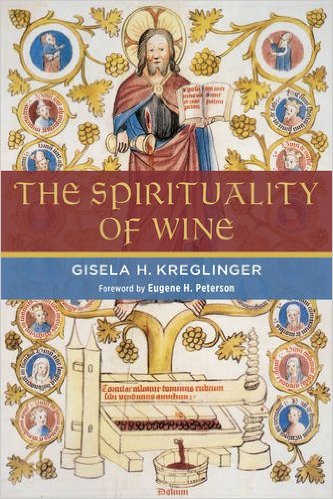 The Spirituality of Wine Gisela H. Kreglinger (Eerdmans) $24.00 I’m not a fan of the medieval tapestry cover art but this beautiful book nonetheless is a personal favorite and should be on the shelf of anyone who is interested in wine, or anyone interested in a theology of the goodness of creation, anyone interested in Christian views of farming and land use, or anyone interested in the Bible at all, actually. The author grew up working in her family’s European vineyard and is now (besides being a trained theologian) a world-renowned vintner. This great book looks at wine in the Bible, wine in religious customs, the abuse of alcohol, and, yes, offers lovely details of the growing of grapes, the making of wine, the world of wine tasting, marketing, selling, enjoying. If you are a casual enjoyer or a serious connoisseur, you will love this thorough, serious work. There is a foreword by Eugene Peterson — makes sense. But what other theological book has a blurb on the back by Alice Waters (one of the iconic food writers of our time), Carolo Petrini (of the Slow Food Movement) and heavy-weight German theologian, Jurgen Moltmann? Salute!
The Spirituality of Wine Gisela H. Kreglinger (Eerdmans) $24.00 I’m not a fan of the medieval tapestry cover art but this beautiful book nonetheless is a personal favorite and should be on the shelf of anyone who is interested in wine, or anyone interested in a theology of the goodness of creation, anyone interested in Christian views of farming and land use, or anyone interested in the Bible at all, actually. The author grew up working in her family’s European vineyard and is now (besides being a trained theologian) a world-renowned vintner. This great book looks at wine in the Bible, wine in religious customs, the abuse of alcohol, and, yes, offers lovely details of the growing of grapes, the making of wine, the world of wine tasting, marketing, selling, enjoying. If you are a casual enjoyer or a serious connoisseur, you will love this thorough, serious work. There is a foreword by Eugene Peterson — makes sense. But what other theological book has a blurb on the back by Alice Waters (one of the iconic food writers of our time), Carolo Petrini (of the Slow Food Movement) and heavy-weight German theologian, Jurgen Moltmann? Salute!
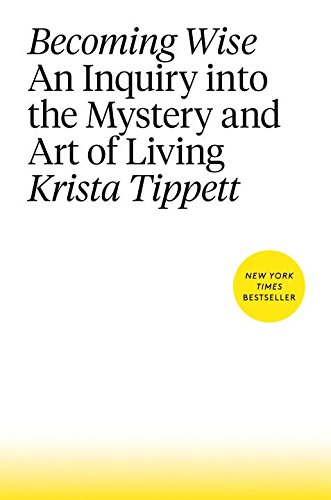 Becoming Wise: An Inquiry Into the Mystery and Art of Living Krista Tippett (Penguin Press) $28.00 I suppose it is no surprise that we list this — we love memoir and storytelling and appreciate those who are perhaps not Christian who are still eloquent about their own quest for wisdom and meaning and purpose. Tippett is, of course, the host of the wonderful, wonderful “On Being” radio show and has interviewed some of the most interesting people on the planet.
Becoming Wise: An Inquiry Into the Mystery and Art of Living Krista Tippett (Penguin Press) $28.00 I suppose it is no surprise that we list this — we love memoir and storytelling and appreciate those who are perhaps not Christian who are still eloquent about their own quest for wisdom and meaning and purpose. Tippett is, of course, the host of the wonderful, wonderful “On Being” radio show and has interviewed some of the most interesting people on the planet.
This is a book years in the making offering insights that she learned from the many remarkable people she has had the privilege of interviewing over the years, weaving together a narrative of her own, and telling the stories of insights she’s gleaned along the way. It’s a mystery and an art, eh? This is a beautiful, wonderful book.
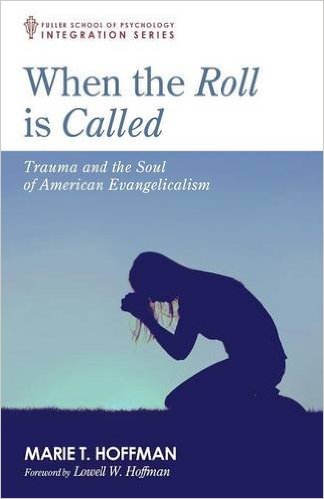 When the Roll is Called: Trauma and the Soul of American Evangelicalism Marie T. Hoffmann (Cascade) $20.00 Now is not the place to describe this book in great detail but it is a short work, developed nicely from a set of lectures, a part of the new “Fuller School of Psychology Integration Series.” (The first in this new series, by the way, was by Messiah College anthropology professor Jenell Paris called The Good News About Conflict: Transforming Religious Struggle over Sexuality) which itself is remarkably insightful and obviously important.
When the Roll is Called: Trauma and the Soul of American Evangelicalism Marie T. Hoffmann (Cascade) $20.00 Now is not the place to describe this book in great detail but it is a short work, developed nicely from a set of lectures, a part of the new “Fuller School of Psychology Integration Series.” (The first in this new series, by the way, was by Messiah College anthropology professor Jenell Paris called The Good News About Conflict: Transforming Religious Struggle over Sexuality) which itself is remarkably insightful and obviously important.
This new one deserves an award if only for having such an audacious goal — to use the lens of trauma studies to get at the psychological hurt within the personalities of those who cooked up the dispensationalist theology (that is, the uniquely US theology of reading the Bible in an odd and unique schema about being raptured away to heaven prior to an unleashing of an Armageddon with the anti-Christ.) Yep, this uses neuro-science and trauma study to look at the lives of a few key characters in American church history (some you’ve most likely heard of, some perhaps not) and comparing them with the “creation-fall-redemption” Biblical summary as seen in Calvin, all so that we might see why American evangelicalism developed as it did. Why did this narrative develop of a “heavenly” gospel versus a “social gospel” and why did the conflict take on the tone that it did? “Prior to the Civil War,” Marie Hoffman says, “these two stories — of salvation in this life and salvation in the life to come — were one, never to be separated, together comprising the good news of Jesus Christ.” When the Roll is Called recounts the traumatic tearing asunder of this beautiful good news and offers hope for the restoration of the whole gospel.
I have never read a book like this although almost all of it was stuff I have heard, here and there, or in some cases have written myself. But the twist she gives, the pastoral insight coupled with clinical vignettes and psycho-spiritual biography around the topics of trauma, was fascinating to say the least.
Notice what practicing Christian psychotherapist James Olthius, Emeritus Professor of Philosophical Theology of the Institute for Christian Studies, Toronto (and author of the amazingly rich The Beautiful Risk) says of it and how his remarks point us to what it captures — it is both a historical study and a guide to deconstruct the dualism of modern evangelicalism that fails to be honest about hurt and pain and lament.
A much-needed investigation of the relationship between Dispensational theology and the lives and times of its founding fathers. . . . Their emphasis on the next life in heaven with a de-emphasis on present life in this world was a defensive strategy constructed to justify and excuse their diminishment of feelings and inattention to experienced trauma. The real shame: the untold number of evangelicals who still fail to experience the joy and healing of their life in Christ because of continued inattention to suffered and unworked-through trauma.
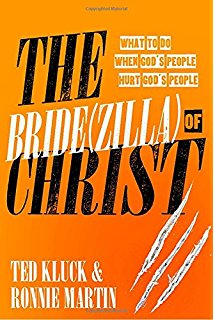 The Bride(zilla) of Christ Ted Luck & Ronnie Martin (Multnomah) $15.99 There are dozens of helpful little books that come out each year on congregational life, on church stuff, on community and Christian views of conflict and such. There is nearly a cottage industry these days writing books about those who are irritated at the church, those who no longer want to attend, or about those who have been hurt by religious shenanigans (real and imagined.) What do we do when local church folks have hurt us — mildly so, or seriously so? What do we do when the Bride of Christ ends up like a manic bridezilla?
The Bride(zilla) of Christ Ted Luck & Ronnie Martin (Multnomah) $15.99 There are dozens of helpful little books that come out each year on congregational life, on church stuff, on community and Christian views of conflict and such. There is nearly a cottage industry these days writing books about those who are irritated at the church, those who no longer want to attend, or about those who have been hurt by religious shenanigans (real and imagined.) What do we do when local church folks have hurt us — mildly so, or seriously so? What do we do when the Bride of Christ ends up like a manic bridezilla?
I loved this book because it was both honest and yet a bit playful (the authors are pretty cool young dudes and the cheeky title offers a hint at their style.) They take the pain of those who have been hurt by toxic faith or abusive churches seriously but they also take the Biblical call to be in Christian fellowship seriously as well. They are not emergent or progressive or whatever the latest term is for those who are re-imagining the church; that is, they are pretty traditional, pretty much loyal to the idea of the local church being an expression of the holy Bride of Christ and they invite us all to be committed to being a part of the local Body of Christ.
Interestingly, both of these guys tell stories of being both wounded by the church and having wounded others in their own ministries. It important stuff. Ted Kluck has written a number of books (include a great one on sports) and teaches at Union University, a Southern Baptist institution, and Ronnie Martin was known for a while as a star within the subculture of Christian pop music, doing innovative electronica and house music under the name of Joy Electric. (Yeah, that’s what I said — that guy? Wow.)
By the way, this is a substantive, gospel-centered book with solid theology about God’s grace, good quotes from Bonhoeffer’s Life Together and their man Tim Keller and a bit from Lewis’s brilliant The Weight of Glory. Although there is also lots of wit on display and a bit of hip sarcasm. You’ve got to love a book that has a chapter title such as “Jesus Loves You But I Think You’re A Jerk” and, in one on authenticity and what they call institutionalized hurt, “I Think Not Having a Gimmick Is Your Gimmick.” Yes! There are bunches of pop culture allusions, from a Rolling Stones joke in the epigram to a National Lampoon movie reference to what may be the only Iggie Pop quote in a Christian book, ever. You see, I just had to award this one.
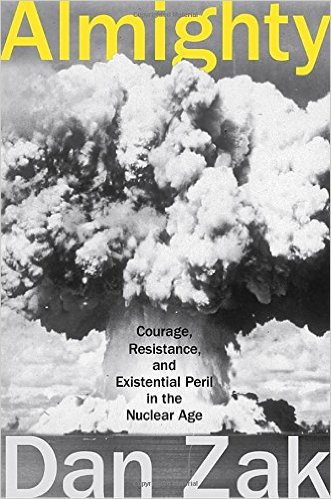 Almighty: Courage, Resistance, and Existential Peril in the Nuclear Age Dan Zak (Blue Rider Press) $27.00 I have told you about this before and it is without a doubt one of the best books I have read all year. It is thick, wide-ranging, and remarkably well research and well-written. There is history here, science, politics, all good background for the basic story this feisty reporter tells — the story of three Christian radicals who feel called to protest the making of nuclear bomb components throughout the country, but mostly at Oak Ridge Tennessee. If you have any interest in why people of faith do courageous and seemingly foolish things like getting arrested to make statements about faith and justice, this book will be illuminating. If you wonder how people come to the place where the dangers of nuclear holocaust consume them, and how they live with themselves facing decades of jail time, this study is brilliantly illuminating. If you need to be reminded of the grave moral threat that our weapons policies and budgets present to our culture and our souls, this book might be transformative for you. Agree or not with Zak’s mostly favorably telling of the lives of Michael Welli, Sister Megan Rice and Greg Boertje-Obed, this is a vast and mighty book, insightful and stimulating. It isn’t many books that near 400 pages that I didn’t want to end, but this is the case with Almighty. I wanted even more, eager to be engaged with this Quixotic movement of “beating swords into plowshares” carried on by hundreds of underground religious people inspired, originally, by the dramatic actions of civil disobedience of the Berrigan brothers, Philip and Daniel. In this year that Daniel died I read a remarkable collection of the prison letters written back and forth for half a lifetime by Dan and Phil. This book, though, is the best way to understand their legacy. Read it.
Almighty: Courage, Resistance, and Existential Peril in the Nuclear Age Dan Zak (Blue Rider Press) $27.00 I have told you about this before and it is without a doubt one of the best books I have read all year. It is thick, wide-ranging, and remarkably well research and well-written. There is history here, science, politics, all good background for the basic story this feisty reporter tells — the story of three Christian radicals who feel called to protest the making of nuclear bomb components throughout the country, but mostly at Oak Ridge Tennessee. If you have any interest in why people of faith do courageous and seemingly foolish things like getting arrested to make statements about faith and justice, this book will be illuminating. If you wonder how people come to the place where the dangers of nuclear holocaust consume them, and how they live with themselves facing decades of jail time, this study is brilliantly illuminating. If you need to be reminded of the grave moral threat that our weapons policies and budgets present to our culture and our souls, this book might be transformative for you. Agree or not with Zak’s mostly favorably telling of the lives of Michael Welli, Sister Megan Rice and Greg Boertje-Obed, this is a vast and mighty book, insightful and stimulating. It isn’t many books that near 400 pages that I didn’t want to end, but this is the case with Almighty. I wanted even more, eager to be engaged with this Quixotic movement of “beating swords into plowshares” carried on by hundreds of underground religious people inspired, originally, by the dramatic actions of civil disobedience of the Berrigan brothers, Philip and Daniel. In this year that Daniel died I read a remarkable collection of the prison letters written back and forth for half a lifetime by Dan and Phil. This book, though, is the best way to understand their legacy. Read it.
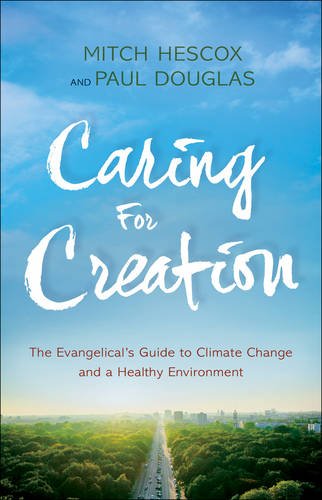 Caring for Creation: The Evangelical’s Guide to Climate Change and a Healthy Environment Mitch Hescox & Paul Douglas (Bethany House) $14.99 I’ve wanted to name this as one of the best books of the year from the moment I read it; that we hosted both authors in the store here the week before the book came out makes it truly one of the most important books of our year. Mitch (the former engineer in the coal industry turned pastor turned creation-care activist) is an old friend and Paul (the weatherman and digital weather-tracking entrepreneur) a new one, and together they hit a big home run, offering Biblical insight, good science, moderate political solutions and good ideas for individuals or churches to pursue in being the caretakers of creation we are called to be. I love these guys and love this book!
Caring for Creation: The Evangelical’s Guide to Climate Change and a Healthy Environment Mitch Hescox & Paul Douglas (Bethany House) $14.99 I’ve wanted to name this as one of the best books of the year from the moment I read it; that we hosted both authors in the store here the week before the book came out makes it truly one of the most important books of our year. Mitch (the former engineer in the coal industry turned pastor turned creation-care activist) is an old friend and Paul (the weatherman and digital weather-tracking entrepreneur) a new one, and together they hit a big home run, offering Biblical insight, good science, moderate political solutions and good ideas for individuals or churches to pursue in being the caretakers of creation we are called to be. I love these guys and love this book!
If you are concerned about climate change and don’t quite know what to do, this is a great starter book. If you have heard that some people don’t even think that humans are causing climate change and fear that some of this has been overly politicized, please read this — both authors are dear Christian leaders, both happen to be Republican and pro-life; that is, this isn’t your typical screed from the far left as some assume all climate change books are. This book deserves to be better known, widely read, and seriously considered. Of the bunches of books on creation care that we shelved this year, this is the one we most want to honor as one of the most important books of 2016.
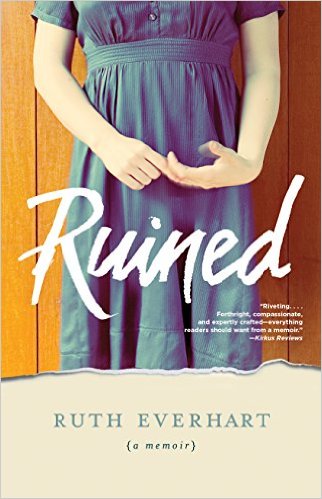 Ruined: A Memoir Ruth Everhart (Tyndale) $14.99 This has been one of those books that has stayed with me for months after having read it and we still get orders based on the review I wrote when it came out last August. You may recall that this book tells the story of Ruth Everhart being a student in the late 1960s at Calvin College in Grand Rapids Michigan where she and her housemates were raped. The story is told well, with enough pathos and tragedy to make it hard, at times (how could it not) but the criminal tragedy itself is not the only story being told. She struggles with the hard questions of God’s sovereignty and why bad things happen –what scholars call theodicy — and rejects some of her conservative Reformed community’s beloved doctrines. Everhart’s faith journey continues as she experiences some healing and hope (but how can one ever fully get over such a devastating assault?) and ends up happily married and a pastor in the PC(USA.) Ruined is “told with candor and unflinching honest” the publisher says, it is “an extraordinary emotional and spiritual journey.” It has won a number of other book awards this season and has been on other “best of the year” lists. Highly recommended.
Ruined: A Memoir Ruth Everhart (Tyndale) $14.99 This has been one of those books that has stayed with me for months after having read it and we still get orders based on the review I wrote when it came out last August. You may recall that this book tells the story of Ruth Everhart being a student in the late 1960s at Calvin College in Grand Rapids Michigan where she and her housemates were raped. The story is told well, with enough pathos and tragedy to make it hard, at times (how could it not) but the criminal tragedy itself is not the only story being told. She struggles with the hard questions of God’s sovereignty and why bad things happen –what scholars call theodicy — and rejects some of her conservative Reformed community’s beloved doctrines. Everhart’s faith journey continues as she experiences some healing and hope (but how can one ever fully get over such a devastating assault?) and ends up happily married and a pastor in the PC(USA.) Ruined is “told with candor and unflinching honest” the publisher says, it is “an extraordinary emotional and spiritual journey.” It has won a number of other book awards this season and has been on other “best of the year” lists. Highly recommended.
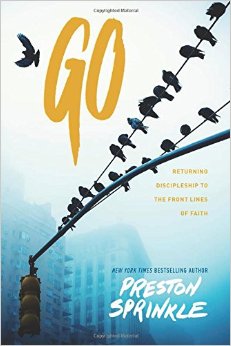 Go: Returning Discipleship to the Front Lines of Faith Preston Sprinkle (NavPress) $14.99 There have been lots of books out these days about whole-life discipleship, about moving beyond nominal faith or internal spirituality, and about actually living out faith as followers of Jesus. A few of these use the insights of the “missional church” movement and invite us to a sort of faithful discipleship that is missional. This one is one of the very best I’ve seen in this simple genre — exciting, visionary, practical, though, and incorporating various insights from the missional movement. There are more academic ones, and we have them. This one, though, is practical and energetic. It’s got some info graphics and data (discovered by research commissioned by the Navigators and the Barna Group, newly presented here) that is usefully shown in order to help us appreciate the urgency of the priorities we will have to attend to if we’re going to return discipleship to the front lines of our faith communities.
Go: Returning Discipleship to the Front Lines of Faith Preston Sprinkle (NavPress) $14.99 There have been lots of books out these days about whole-life discipleship, about moving beyond nominal faith or internal spirituality, and about actually living out faith as followers of Jesus. A few of these use the insights of the “missional church” movement and invite us to a sort of faithful discipleship that is missional. This one is one of the very best I’ve seen in this simple genre — exciting, visionary, practical, though, and incorporating various insights from the missional movement. There are more academic ones, and we have them. This one, though, is practical and energetic. It’s got some info graphics and data (discovered by research commissioned by the Navigators and the Barna Group, newly presented here) that is usefully shown in order to help us appreciate the urgency of the priorities we will have to attend to if we’re going to return discipleship to the front lines of our faith communities.
I like that Sprinkle teaches us to be disciples of Jesus together and that that demands community, spiritual formation, developing the Christian mind, thinking about notions of vocation and calling, and more. Happily, he is not unaware of the Biblical mandate to be agents of social transformation, seeking justice, being peacemakers, and working for racial reconciliation and the like. Go isn’t primarily a book about social action but he isn’t tone deaf to the needs of the aching world. Sprinkle brings an energy and encouragement to his call to be more vibrant in faith and he offers something for the young Christian who is new to Biblically-informed living as well as something for those of us who need an upbeat reminder to get busy seeking God’s Kingdom in all we do. Anyway, it’s one of many but for a variety of reasons I think it is one of the best I’ve seen. Read it and get going!
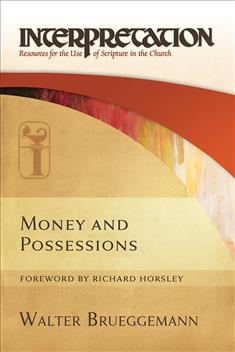 Money and Possessions Walter Brueggemann (Westminster John Knox) $40.00 Do you know the popular “Interpretation” Bible commentary series? Somewhat in the spirit of these mainline denominational semi-scholarly commentaries this publisher inaugurated a few years ago a series called Interpretation Resources for the Use of Scripture in the Church. That is, they’ve brought similar sorts of good scholars who are willing to summarize complex theological and Biblical themes in one handsome hardback book on a topic, not a certain book of the Bible. There have been several volumes in this series: one on the sacraments, one important one called Canon and Creed; the one on violence in the Scriptures by Pittsburgh Theological Seminary’s Jerome F.D. Creech is very good. Ellen Davis did one on Biblical prophecy with the subtitle “Perspectives for Christian Theology, Discipleship, and Ministry” and Richard Lischer did the one on reading the parables. There is a big one on the Ten Commandments offering ways to preach and teach and live by these texts within our contemporary setting. You get the picture, eh?
Money and Possessions Walter Brueggemann (Westminster John Knox) $40.00 Do you know the popular “Interpretation” Bible commentary series? Somewhat in the spirit of these mainline denominational semi-scholarly commentaries this publisher inaugurated a few years ago a series called Interpretation Resources for the Use of Scripture in the Church. That is, they’ve brought similar sorts of good scholars who are willing to summarize complex theological and Biblical themes in one handsome hardback book on a topic, not a certain book of the Bible. There have been several volumes in this series: one on the sacraments, one important one called Canon and Creed; the one on violence in the Scriptures by Pittsburgh Theological Seminary’s Jerome F.D. Creech is very good. Ellen Davis did one on Biblical prophecy with the subtitle “Perspectives for Christian Theology, Discipleship, and Ministry” and Richard Lischer did the one on reading the parables. There is a big one on the Ten Commandments offering ways to preach and teach and live by these texts within our contemporary setting. You get the picture, eh?
And so it seemed a stroke of genius to recruit Walter Brueggemann to do this massive study of nearly every significant text in the whole Bible that deals with money and economics. Although Walt is by training an Old Testament scholar and is passionate about the whole Bible, he has studied economics and social theory more than just about anybody I know (including some who work in business and economics!) He offers exegetical comment informed by the broad and wide church, naming what Church Fathers or people like Calvin or Luther (or modern liberation theologians for that matter) have said. He opens the hefty Money and Possessions with an epigram (“The Three Cries of History”) from Steinbeck’s Grapes of Wrath which sets us up powerfully for a study that is not only rigorous but urgent and well written. The foreword by Richard Horsley is important and this resource is one we should celebrate, study, and learn somehow, by God’s great grace, to apply. It may not be the final word and I suspect there are some other authors he should have cited and perspectives he should have more overtly grappled with, but this is, doubtlessly, one of the major contributions of the year in Biblical studies for God’s people.
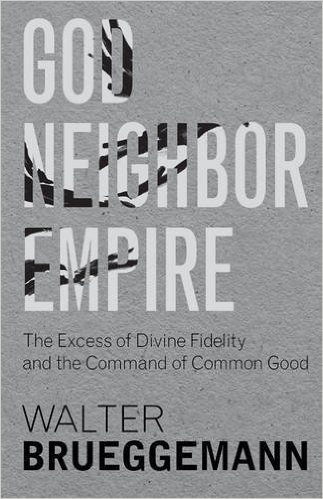
For what it is worth it is hard not to honorably mention the other new, significant work released this year by Bruggemann, God, Neighbor, Empire: The Excess of Divine Fidelity and the Command of Common Good published in hardback by Baylor University Press. ($24.95.) As I said in our newsletter when I announced it earlier this fall, these were lectures given at Fuller Theological Seminary. Very, very impressive and certainly one of the great books of the year.
MOST FUN BOOK TO SELL THIS YEAR
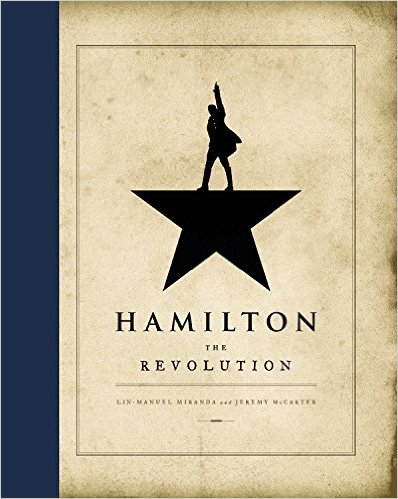 Hamilton: The Revolution Lin-Manuel Miranda and Jeremy McCarter (Hachette/Grand Central Publishing) $45.00 Well, yeah. Of course. The ground-breaking musical won the Pulitzer Prize for drama and this book gives readers an unprecedented view of both revolutions — the US one in which that the poor kid of the Caribbean fought against the British and this hip-hop once-in-a-generation theatrical piece that broadened the sound of Broadway. This over-sized book tells the history of the show, features photos and excerpts of notebooks and emails, interviews with Questlove and Stephen Sonheim and over 40 other people involved in the production which has become a national phenomenon. We have only sold a few of these but what a blast showing it off and seeing the joy when customers realize we carry it. This is a very important and truly handsome, fantastic volume that you will want to keep.
Hamilton: The Revolution Lin-Manuel Miranda and Jeremy McCarter (Hachette/Grand Central Publishing) $45.00 Well, yeah. Of course. The ground-breaking musical won the Pulitzer Prize for drama and this book gives readers an unprecedented view of both revolutions — the US one in which that the poor kid of the Caribbean fought against the British and this hip-hop once-in-a-generation theatrical piece that broadened the sound of Broadway. This over-sized book tells the history of the show, features photos and excerpts of notebooks and emails, interviews with Questlove and Stephen Sonheim and over 40 other people involved in the production which has become a national phenomenon. We have only sold a few of these but what a blast showing it off and seeing the joy when customers realize we carry it. This is a very important and truly handsome, fantastic volume that you will want to keep.
A SPECIAL DUAL “READ THESE TOGETHER” AWARD: BEST BOOKS FOR SKEPTICS AND SEEKERS
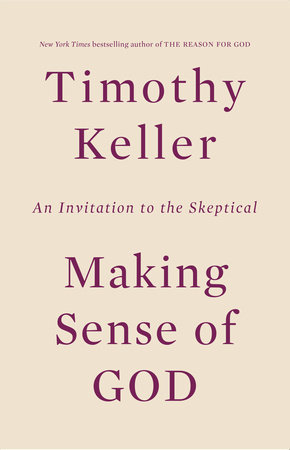
 The Sin of Certainty: Why God Desires Our Trust More Than Our “Correct” Beliefs Peter Enns (HarperOne) $25.99 I reviewed this cautiously, not wanting to give the impression that the book throws out notions of truth or doctrine or that I fully agreed with Pete’s provocative prose. But many others I respect have grappled with this and I think the consensus is that even if he overstates this just a bit — and he is adamant that reading the Bible honestly can be damaging to one’s faith, given the sordid stuff found in the Word of God and is adamant that trusting God is something other than agreeing to certain theological dogmas — this is a thoughtful, winsome, inviting story of one man’s journey, offering permission for others to doubt, to struggle, to reject parts of the dogma passed down (especially from evangelicalism) and to forge a living relationship with the God who is there and who loves us so. I think it is a great gift for those skeptical of faith because they know a bit and have catapulted overboard, angry about easy answers they’ve been given, frustrated that the Bible seems to be racist and sexist and full of wrath and genocide. This book not only invites folks to honor their own questions and doubts but, in fact, says it is an idol to pretend to have ultimate certitude. Good stuff, but perhaps supplement it with the more classic view of knowledge implicit in the Keller book below.
The Sin of Certainty: Why God Desires Our Trust More Than Our “Correct” Beliefs Peter Enns (HarperOne) $25.99 I reviewed this cautiously, not wanting to give the impression that the book throws out notions of truth or doctrine or that I fully agreed with Pete’s provocative prose. But many others I respect have grappled with this and I think the consensus is that even if he overstates this just a bit — and he is adamant that reading the Bible honestly can be damaging to one’s faith, given the sordid stuff found in the Word of God and is adamant that trusting God is something other than agreeing to certain theological dogmas — this is a thoughtful, winsome, inviting story of one man’s journey, offering permission for others to doubt, to struggle, to reject parts of the dogma passed down (especially from evangelicalism) and to forge a living relationship with the God who is there and who loves us so. I think it is a great gift for those skeptical of faith because they know a bit and have catapulted overboard, angry about easy answers they’ve been given, frustrated that the Bible seems to be racist and sexist and full of wrath and genocide. This book not only invites folks to honor their own questions and doubts but, in fact, says it is an idol to pretend to have ultimate certitude. Good stuff, but perhaps supplement it with the more classic view of knowledge implicit in the Keller book below.
Making Sense of God: An Invitation to the Skeptical Timothy Keller (Viking) $27.00 Keller is a bit different than Pete Enns although they both have old connections with Westminster Theological Seminary. (Keller is probably their most esteemed alum and Pete is, well, their most notorious, having been fired there a few years back.) This book is thoughtful, literate, serious, philosophically informed by winsome in its own way, inviting those who have an allergy to thinking about the plausibility of God to consider their skepticism and consider whether it is even sensible to think about God and religion as plausible. In this sense, it is a prequel to Keller’s useful Reason for God. Keller is always worth reading but maybe his firm apologetic could be soften by the more accommodating tone of Enns, above.
SPECIAL DUAL “READ THESE TOGETHER” AWARD FOR THOSE WHO LIKE ARTFUL, CONTEMPORARY WOMEN WRITERS WHO ARE HONEST ABOUT OUR STRESSED LIVES
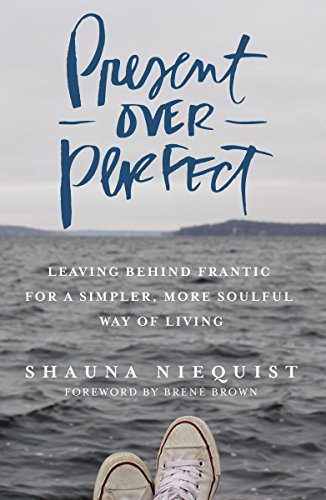
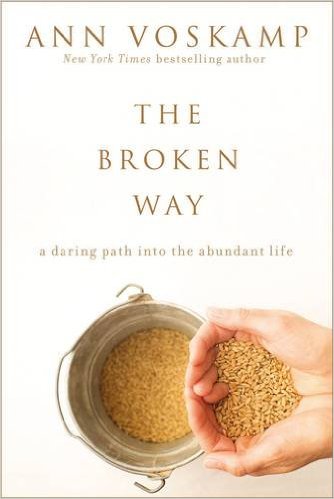 The Broken Way: A Daring Path Into the Abundant Life Ann Voskamp (Zondervan) $22.99 I am a fan of Ann Voskamp and loved her famous One Thousand Gifts that invited us to embrace and be grateful for the goodness of God’s world, finding grace in the ordinary and beauty in the here and now. It became a best seller for good reason — it is nicely written, creatively considered, lovely, a tiny bit edgy but utterly orthodox, despite what a few cranks said. Her two on Advent were devotional and handsome, too. This one, though, moves her prose to a deeper level as she offers a profound (but not too heavy) study of the brokenness we encounter, embracing our pain, moving into the realities of who we are as hurting people. In an earlier BookNotes review I noted that there were very good blurbs on the back from Philip Yancey (who called it “rich” and “gritty”) and from Eugene Peterson. Christine Caine, naturally, raved. It’s really good.
The Broken Way: A Daring Path Into the Abundant Life Ann Voskamp (Zondervan) $22.99 I am a fan of Ann Voskamp and loved her famous One Thousand Gifts that invited us to embrace and be grateful for the goodness of God’s world, finding grace in the ordinary and beauty in the here and now. It became a best seller for good reason — it is nicely written, creatively considered, lovely, a tiny bit edgy but utterly orthodox, despite what a few cranks said. Her two on Advent were devotional and handsome, too. This one, though, moves her prose to a deeper level as she offers a profound (but not too heavy) study of the brokenness we encounter, embracing our pain, moving into the realities of who we are as hurting people. In an earlier BookNotes review I noted that there were very good blurbs on the back from Philip Yancey (who called it “rich” and “gritty”) and from Eugene Peterson. Christine Caine, naturally, raved. It’s really good.
Present Over Perfect: Leaving Behind Frantic for a Simpler, More Soulful Way of Living Shauna Niequist (Zondervan) $22.99 Many readers, especially younger adult women, adore this writer who has told her stories in memoirs such as Orange Tangerine and Bittersweet. Her book about food — Bread and Wine — is a hugely popular book, one I adored. Niequist is a beautiful, contemporary writer, again, with a certain very honest, contemporary style, and she uses it to full effect here as she admits to being burned out, stressed, attempting to do too much, perhaps driven by an unhealthy perfectionism. Brene Brown wrote the forward, which fits. It’s pretty inspiring, if a bit overblown — sure she’s exhausted, but she’s got a cool lake house and, well, is friends with Brene Brown. Jennifer Hatmaker says “I will go to the grave thankful for this message. It has changed my life.” If you want deep connection rather than just frantic, this story can help.
BEST BOOK OF POETRY
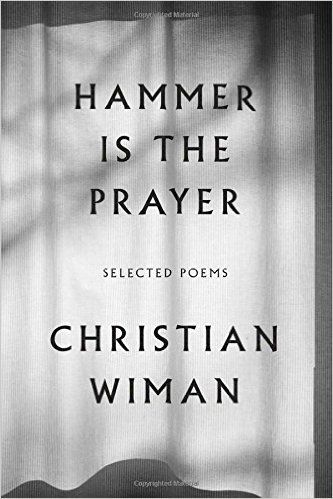 Hammer is the Prayer: Selected Poems Christian Wiman (Farrar Straus Giroux) $26.00 I’ll be the first to admit I am not a connoisseur of fine poetry and although we enjoy having a rather eccentric poetry selection, none of us here are qualified to say what is “the best.” But I know enough to know that there are a handful of poets whose work is highly regarded and whose own faith journey we know has informed their serious work. Wendell Berry comes to mind, of course, and we value the wonderful work of Mary Oliver (whose collection of essays this year, Upstream, is a volume we’ve so enjoyed promoting.) His memoir of Christian faith, My Bright Abyss: Meditations of a Modern Believer is extraordinary. Christian Wiman, you should know, edited for decades the important Poetry Journal. He now teaches religion and literature at Yale Divinity School. This is the first major compilation of selected poems and it seemed an obvious choice to honor this year.
Hammer is the Prayer: Selected Poems Christian Wiman (Farrar Straus Giroux) $26.00 I’ll be the first to admit I am not a connoisseur of fine poetry and although we enjoy having a rather eccentric poetry selection, none of us here are qualified to say what is “the best.” But I know enough to know that there are a handful of poets whose work is highly regarded and whose own faith journey we know has informed their serious work. Wendell Berry comes to mind, of course, and we value the wonderful work of Mary Oliver (whose collection of essays this year, Upstream, is a volume we’ve so enjoyed promoting.) His memoir of Christian faith, My Bright Abyss: Meditations of a Modern Believer is extraordinary. Christian Wiman, you should know, edited for decades the important Poetry Journal. He now teaches religion and literature at Yale Divinity School. This is the first major compilation of selected poems and it seemed an obvious choice to honor this year.
FOUR SPECIAL SLEEPER AWARDS THAT DESERVED MUCH MORE ACCLAIM THIS YEAR
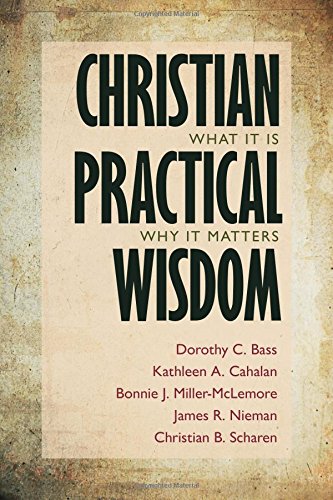 Christian Practical Wisdom: What It Is, What It Matters Dorothy Bass and others (Eerdmans) $30.00 We easily like to suggest that someone is wise and I often use the word to describe certain books. But what do we mean by that? Are we maybe too glib about that? What practices are rooted in creational wisdom, hearing the voice of God’s truth embedded in the realities of God’s creation? How good are we at intuiting the ways of the Lord — even if we know our Bibles well? Does faithful insight about daily living really matter and if so, how so? What does it look like and how can we deeper our formation in daily wisdom? These collected essays are fairly academic but there is no volume quite like this in print and some approach sheer brilliance. It’s maybe a bit too much for ordinary book clubs or Adult Ed classes at church and perhaps it isn’t useful as a theology textbook as such — although I’d say without irony that it would be a wise move to use this book in educational settings. Books like this are worth their weight in gold but sadly are often not given their due. Kudos!
Christian Practical Wisdom: What It Is, What It Matters Dorothy Bass and others (Eerdmans) $30.00 We easily like to suggest that someone is wise and I often use the word to describe certain books. But what do we mean by that? Are we maybe too glib about that? What practices are rooted in creational wisdom, hearing the voice of God’s truth embedded in the realities of God’s creation? How good are we at intuiting the ways of the Lord — even if we know our Bibles well? Does faithful insight about daily living really matter and if so, how so? What does it look like and how can we deeper our formation in daily wisdom? These collected essays are fairly academic but there is no volume quite like this in print and some approach sheer brilliance. It’s maybe a bit too much for ordinary book clubs or Adult Ed classes at church and perhaps it isn’t useful as a theology textbook as such — although I’d say without irony that it would be a wise move to use this book in educational settings. Books like this are worth their weight in gold but sadly are often not given their due. Kudos!
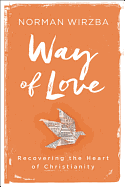 The Way of Love: Recovering the Heart of Christianity Norman Wirzba (HarperOne) $25.99 I’m not sure why this book didn’t take off — the publisher didn’t seem to do much with it, it seems., but what a book it is! Wirzba is a thoughtful and important scholar (his speciality area is environmental theology and he has books about Wendell Berry and a very sophisticated study of the theology of food, so he’s kind of a cool writer these days.) Even with a lovely foreword by Diana Butler Bass, drawing on her beautiful study called Grounded and blurbs by the likes of Eugene Peterson (who says “Connecting love and the hope of heaven, Wirzba provides a most satisfying and convincing conclusion”) it just hasn’t been widely acclaimed. There frankly aren’t that many profound books on this focal point of Christian faith; I wonder why that is? Are we afraid to buckle down and study love? Do we not think that love is a way of life? This book should be better known among us.
The Way of Love: Recovering the Heart of Christianity Norman Wirzba (HarperOne) $25.99 I’m not sure why this book didn’t take off — the publisher didn’t seem to do much with it, it seems., but what a book it is! Wirzba is a thoughtful and important scholar (his speciality area is environmental theology and he has books about Wendell Berry and a very sophisticated study of the theology of food, so he’s kind of a cool writer these days.) Even with a lovely foreword by Diana Butler Bass, drawing on her beautiful study called Grounded and blurbs by the likes of Eugene Peterson (who says “Connecting love and the hope of heaven, Wirzba provides a most satisfying and convincing conclusion”) it just hasn’t been widely acclaimed. There frankly aren’t that many profound books on this focal point of Christian faith; I wonder why that is? Are we afraid to buckle down and study love? Do we not think that love is a way of life? This book should be better known among us.
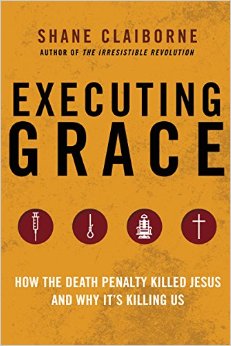 Executing Grace: How the Death Penalty Killed Jesus and Why It’s Killing Us Shane Claiborne (HarperOne) $17.99 I can’t tell you how much I admire Shane and how much I agree with him in this book; one of the first campaigns of political activism I joined in college was an effort to stop executions in our state. Yet, despite my passion and my affection for Shane, I’ll admit this book has some weaknesses not the least of which is that the subtitle is off putting for some, suggesting that the death of Christ on the cross and the atonement are somehow problematic, which is not the topic of this book. That Shane doesn’t do a systematic Bible study hurts the book’s cause, too (mostly that would be in his avoiding Genesis 9.) Nonetheless, the passion for justice and the human kindness that is on display here, coupled with tons of fresh research, storytelling, political analysis and spiritual reflections makes this a must-read. You should know that even some who think that capitol punishment is in principle allowed by Scripture still think, given the racism and injustices so deeply enmeshed in our current criminal justice system, that it cannot be applied justly and they therefore oppose it. (That was the position, by the way, of one of the most rigorous theological voices in the field of criminal justice, Charles Colson, which surprisingly got him on the cover of Sojourners magazine. I myself talked to Chuck about that briefly before he died…) Anyway, I wish more folks had open minds about learning about this topic and were willing to give this very informative, very moving book a try. Kudos to those who did. You know who you are.
Executing Grace: How the Death Penalty Killed Jesus and Why It’s Killing Us Shane Claiborne (HarperOne) $17.99 I can’t tell you how much I admire Shane and how much I agree with him in this book; one of the first campaigns of political activism I joined in college was an effort to stop executions in our state. Yet, despite my passion and my affection for Shane, I’ll admit this book has some weaknesses not the least of which is that the subtitle is off putting for some, suggesting that the death of Christ on the cross and the atonement are somehow problematic, which is not the topic of this book. That Shane doesn’t do a systematic Bible study hurts the book’s cause, too (mostly that would be in his avoiding Genesis 9.) Nonetheless, the passion for justice and the human kindness that is on display here, coupled with tons of fresh research, storytelling, political analysis and spiritual reflections makes this a must-read. You should know that even some who think that capitol punishment is in principle allowed by Scripture still think, given the racism and injustices so deeply enmeshed in our current criminal justice system, that it cannot be applied justly and they therefore oppose it. (That was the position, by the way, of one of the most rigorous theological voices in the field of criminal justice, Charles Colson, which surprisingly got him on the cover of Sojourners magazine. I myself talked to Chuck about that briefly before he died…) Anyway, I wish more folks had open minds about learning about this topic and were willing to give this very informative, very moving book a try. Kudos to those who did. You know who you are.
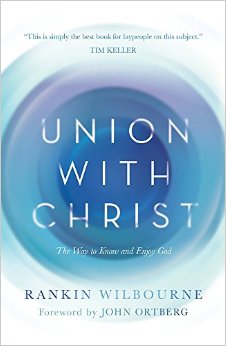 Union with Christ: The Way to Know and Enjoy God Rankin Wilbourne (Cook) $19.99 Although its a bit lengthy, I think I will honor this book by repeating what I wrote about it when I featured it in September in our BookNotes: Every now and then a book comes along that I categorize as a “sleeper.” That is, few know the author, the publisher isn’t particularly renowned, the national press most likely isn’t going to do stories about it. But it is worth its weight in gold, ought to be known, is a true winner. We can only hope that Wilbourne’s new book gets noticed and used and stays in print long enough to become very well known. Union with Christ is a book that does what we might think of as basic Christian growth, just solid teaching about the nature of God and how God works with and within us, but it is better than most such books. It offers clear-headed (and often very inspiring) advice, not terribly dressy or loud, just solid teaching, guidance, motivation, good stories, good quotes, well put. Union with Christ: The Way to Know and Enjoy God answers big worldviewish kinds of questions – who am I? Why am I here? Where am I headed ? How can I become that which I want to be? Pastor Wilbourne is good on questions like “what is the gospel” and invites us into a way of thinking about Christian formation that is practical and wise.
Union with Christ: The Way to Know and Enjoy God Rankin Wilbourne (Cook) $19.99 Although its a bit lengthy, I think I will honor this book by repeating what I wrote about it when I featured it in September in our BookNotes: Every now and then a book comes along that I categorize as a “sleeper.” That is, few know the author, the publisher isn’t particularly renowned, the national press most likely isn’t going to do stories about it. But it is worth its weight in gold, ought to be known, is a true winner. We can only hope that Wilbourne’s new book gets noticed and used and stays in print long enough to become very well known. Union with Christ is a book that does what we might think of as basic Christian growth, just solid teaching about the nature of God and how God works with and within us, but it is better than most such books. It offers clear-headed (and often very inspiring) advice, not terribly dressy or loud, just solid teaching, guidance, motivation, good stories, good quotes, well put. Union with Christ: The Way to Know and Enjoy God answers big worldviewish kinds of questions – who am I? Why am I here? Where am I headed ? How can I become that which I want to be? Pastor Wilbourne is good on questions like “what is the gospel” and invites us into a way of thinking about Christian formation that is practical and wise.
On the back of the book it asks “Do you secretly wonder if there’s more to life… but feel stuck?” I can’t quite figure out if this marketing line is useful – it is obviously trying not to seem like a heady theology text or a mystical spirituality book: it’s practical, it is saying. Maybe it is just the way they think to market stuff at David C. Cook given their own understanding of the market for their often passionate, often upbeat, often young-adult oriented evangelical books. But I’m telling you, Union with Christ is more than a call to be passionate, more than a cheap promise that if you find God with enough enthusiasm, voila, everything will come alive. It may be perfect if you feel stuck, but it isn’t primarily about that.
No, this book reminds us that this formation stuff is a longer, slower process, and it is dependent on getting a few very foundational truths right. One of these classic truths – a favorite of John Calvin’s, by the way – is the notion of “union with Christ.” I was first introduced to this notion by a book also called Union with Christ that has been out of print but is now available again by the beloved Lewis Smedes. Others have written on it. Wilbourne’s, though, is very, very special. He studied at Princeton Theological Seminary and is not only well read but a great storyteller. It is a really, really good book and I commend it to you.
In fact, Tim Keller says “This is simply the best book for laypeople on this subject.”
Less succinct but equally compelling is this endorsement by John Ortberg who wrote a very nice forward:
I’m trying to remember the last time I was more excited about a new book or a new author. Rankin Wilbourne brings a remarkable flair for writing, and a great breadth and depth of learning, to the most important subject in the world: What is the true and sufficient destiny for human life?
The author is artfully literary (with an epigram from Dante in the front) without being too highbrow, draws on pop culture, too, and tells some good stories. He’s theologically conventional and orthodox, which is to say, he isn’t off the rails or weird. Union with Christ: The Way to Know and Enjoy God has this tone of urgency – it is important, important content – but is reasonable and lucid. It is helpful, trustworthy, interesting, insightful, and I am glad to have found it. It deserves to be well known. Kudos to Cook for the handsome hardback design and making this such a nice, good volume. It deserves to be taken seriously.
BEST WORST BOOK OF THE YEAR
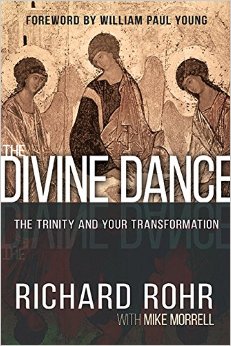 Divine Dance: The Trinity and Your Transformation Richard Rohr with Mike Morrell (Whitaker House) $23.99 Well, I am not one to say that theology doesn’t matter or that ideas about God are somehow beyond thinking well about and while I don’t want to overstate the role of theology — an old mentor of mine used to rail about turning theology into an idol which he called theolog-ism — I do think that theology matters. A lot. I agree with Tozer when he said that the most important part of anyone’s worldview is their view of God. So this is vital, important stuff. I applaud Father Rohr for inviting us into relationship with God and for allowing us to reflect on the meaning of God’s nature.
Divine Dance: The Trinity and Your Transformation Richard Rohr with Mike Morrell (Whitaker House) $23.99 Well, I am not one to say that theology doesn’t matter or that ideas about God are somehow beyond thinking well about and while I don’t want to overstate the role of theology — an old mentor of mine used to rail about turning theology into an idol which he called theolog-ism — I do think that theology matters. A lot. I agree with Tozer when he said that the most important part of anyone’s worldview is their view of God. So this is vital, important stuff. I applaud Father Rohr for inviting us into relationship with God and for allowing us to reflect on the meaning of God’s nature.
As you may know from my lengthy BookNotes review of this when it first came out I both admire Fr. Richard Rohr immensely and yet am troubled by any number of oddball moves made in this quirky book. There’s more that can and should be said and I advise reading this with discernment and in conversation with other more standard books on the topic . (Rohr and Morrell rather stupidly suggest that their aren’t many such books and that the church has been somehow silent about the Trinity in the last centuries. Huh?) Still, I list it here because I devoured it, re-read parts, was nicely moved by some of it, disagreed with much, and realize it is a major work of our time and deserves to be named in any list of the most important books this year. The Divine Dance deserves mention, even if in my playfully backhanded way.
One scholarly reviewer was so alarmed by its deviousness that he said that if anyone recommends it you should never listen to anything that person says again. All-rightee-then; I hope you don’t unsubscribe from our BookNotes because I rather ironically honor this book. (And, conversely, I hope you don’t hate me because I disapprove of some of it.) But there you have it: I think it’s a pretty bad book, nicely made with some tender portions, and yet deserves noting as it has been widely discussed and is a bit of a publishing phenomenon. For better or worse, or both, it’s a notable book of 2016. If your interested, read it for yourself, maybe with others, maybe in conversation with other more conventional books on the nature of the Triune God, and make up your own mind.
VERY VERY PERSONAL FAVORITES
Besides the ones in my top ten, of course each of which I enjoyed immensely…
…some that brought me great, particular reading pleasure.
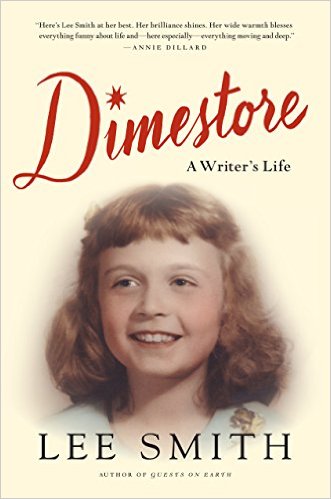 Dimestore: A Writer’s Life Lee Smith (Algonquin Books of
Dimestore: A Writer’s Life Lee Smith (Algonquin Books of
Chapel Hill) $24.95 Beth and I would both say this is one of the most
delightful, enjoyable books we’ve read all year and I literally had to stop reading sometime to catch my breath, stunned by her turns of phrases and lovely, lovely prose. I’m sure it would be a tremendous blessing to those, at least, who like Lee Smith’s popular
Southern novel. This includes some great stuff about the writing life and about Southern literature but it is somewhat of a memoir including much about her
girlhood and the small town in which she grew up and her father’s
beloved five and dime store. In fact, I caught just a little of her Fresh Air interview about the closing of the family retail small-town business and that is what first caught my attention. One reviewer said it is “a pitch-perfect mining
of the memories, desires, and imaginations fueling one of the South’s —
no, one of America’s — master storytellers.” Perhaps akin to Euodora
Welty’s One Writer’s Beginnings, it is fun, fresh, upbeat,
sentimental, wise, and so very enjoyable to read. Annie Dillard says
“her brilliance shines. Her wide warmth blesses everything funny about
life and — here especially — everything moving and deep.”
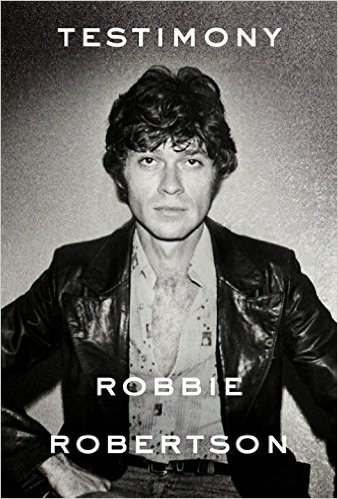 Testimony Robbie Robertson (Crown Archetype) $30.00 Oh man, this had my name all over it — the story of the early days of the guys who became Dylan’s backup band when he notoriously went electric, The Band, and their whirl-wind careers writing in New York city, later at Big Pink, playing Woodstock, doing early Americana music — who doesn’t love them singing in rough Appalachian harmonies “take a load off Fanny” from “The Weight” or “The Night They Drove Old Dixie Down” or the Canadian-Cajun story of “Acadian Driftwood”? It tells of their friendships with old bluesmen, soul singers, Van Morrison, Joni MItchell and everybody from Eric Clapton to the Beatles to Dylan, of course, all play major roles. All manner of folks show up, from Salvador Dali to Japanese filmmakers to drug dealers of every imaginable sort. It tells of their fraught lives up until their big ending with the extraordinary show that became the Scorsese rock documentary The Last Waltz. With big fat bios from heros of mine like Bruce Springsteen and Paul Simon last month, this is the one I curled up with first.
Testimony Robbie Robertson (Crown Archetype) $30.00 Oh man, this had my name all over it — the story of the early days of the guys who became Dylan’s backup band when he notoriously went electric, The Band, and their whirl-wind careers writing in New York city, later at Big Pink, playing Woodstock, doing early Americana music — who doesn’t love them singing in rough Appalachian harmonies “take a load off Fanny” from “The Weight” or “The Night They Drove Old Dixie Down” or the Canadian-Cajun story of “Acadian Driftwood”? It tells of their friendships with old bluesmen, soul singers, Van Morrison, Joni MItchell and everybody from Eric Clapton to the Beatles to Dylan, of course, all play major roles. All manner of folks show up, from Salvador Dali to Japanese filmmakers to drug dealers of every imaginable sort. It tells of their fraught lives up until their big ending with the extraordinary show that became the Scorsese rock documentary The Last Waltz. With big fat bios from heros of mine like Bruce Springsteen and Paul Simon last month, this is the one I curled up with first.
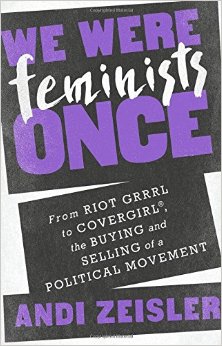 We Were Feminists Once: From Riot Grrrl to Covergirl, the Buying and Selling of a Political Movement Andi Zeisler (Public Affairs) $26.99 I am not kidding, this is maybe my favorite book of the year. Beth and I have long identified as feminists and this feisty young woman — she founded Bitch magazine — is wonderfully written, incredibly energetic, a storyteller and cultural critic who is a force to be reckoned with. Of course as an evangelical Christian I disagree with basic stuff in her worldview and despise some of her views (and on occasion found her vulgarity gratuitous.) Still, her critical engagement with how pop culture co-opts big ideas and how even revolutionary ideology can be tamed and sold is so interesting and so valuable. She looks at TV, at books, at movies, and rock and pop music (up to and including a splendid analysis of Beyonce.) Her chapter on feminist advertising and the reforming influence feminism had (and is having) on corporate culture is brilliant, entertaining and insightful. More broadly, I’m interested in anyone who can show how radical ideas can or cannot be applied to culture and what true, lasting reform looks like. As a case study in cultural influence and as a morality tale about the dangers of being co-opted, We Were Feminists Once is very important. For anyone who likes to read about pop culture, it’s a blast.
We Were Feminists Once: From Riot Grrrl to Covergirl, the Buying and Selling of a Political Movement Andi Zeisler (Public Affairs) $26.99 I am not kidding, this is maybe my favorite book of the year. Beth and I have long identified as feminists and this feisty young woman — she founded Bitch magazine — is wonderfully written, incredibly energetic, a storyteller and cultural critic who is a force to be reckoned with. Of course as an evangelical Christian I disagree with basic stuff in her worldview and despise some of her views (and on occasion found her vulgarity gratuitous.) Still, her critical engagement with how pop culture co-opts big ideas and how even revolutionary ideology can be tamed and sold is so interesting and so valuable. She looks at TV, at books, at movies, and rock and pop music (up to and including a splendid analysis of Beyonce.) Her chapter on feminist advertising and the reforming influence feminism had (and is having) on corporate culture is brilliant, entertaining and insightful. More broadly, I’m interested in anyone who can show how radical ideas can or cannot be applied to culture and what true, lasting reform looks like. As a case study in cultural influence and as a morality tale about the dangers of being co-opted, We Were Feminists Once is very important. For anyone who likes to read about pop culture, it’s a blast.
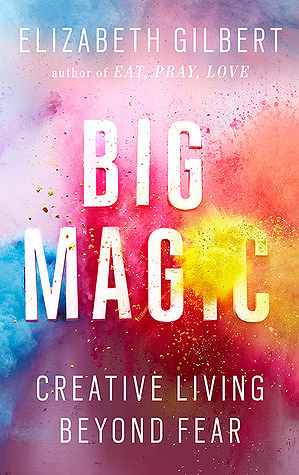 Big Magic: Creative Living Beyond Fear Elizabeth Gilbert (Riverhead Books) $16.00 I didn’t read this when it came out late in 2015 (even though I absolutely adored her epic novel The Signature of All Things that year) but took up Big Magic at the end of 2016 when it came out in paperback so feel like I can name it now. I firmly disagree with her basic thesis that the muse has personality — creativity for her, as with many ancient pagans, can literally visit you (or depart if you are not cooperative) sort of like spirits or angels. I disagree with this view of how creativity works and think a Christian aesthetic theory that is consistent with a Biblical worldview (as explored, say, by Calvin Seerveld or Nicholas Wolterstorff or Jeremy Begbie) presents a very different view and thereby leads to different attitudes and maybe different practices. Yet, she tells some unforgettable stories that are nearly incredible about her view, including one encounter involving her friend and fellow writer Ann Patchett (perhaps you saw her stunning TED talk on this. Wow.) I chose not to take her idea literally, and that freed me up to so enjoy this sweet and I think very wise book.
Big Magic: Creative Living Beyond Fear Elizabeth Gilbert (Riverhead Books) $16.00 I didn’t read this when it came out late in 2015 (even though I absolutely adored her epic novel The Signature of All Things that year) but took up Big Magic at the end of 2016 when it came out in paperback so feel like I can name it now. I firmly disagree with her basic thesis that the muse has personality — creativity for her, as with many ancient pagans, can literally visit you (or depart if you are not cooperative) sort of like spirits or angels. I disagree with this view of how creativity works and think a Christian aesthetic theory that is consistent with a Biblical worldview (as explored, say, by Calvin Seerveld or Nicholas Wolterstorff or Jeremy Begbie) presents a very different view and thereby leads to different attitudes and maybe different practices. Yet, she tells some unforgettable stories that are nearly incredible about her view, including one encounter involving her friend and fellow writer Ann Patchett (perhaps you saw her stunning TED talk on this. Wow.) I chose not to take her idea literally, and that freed me up to so enjoy this sweet and I think very wise book.
Anyway, Big Magic, despite this almost goofy view of creative ideas looking for participants to embody them, has some of the sanest, most delightful, inspiring, helpful, guidance for writers and artists and creative folks that I’ve read anywhere. I love how she devastates the romantic idea that suffering is good for art or that writers and musicians and artists should get a pass when it comes to addictive and unhealthy behaviors; no! She is so good on this, warning us all about the dangers of romantic views and guiding us towards healthy, life-giving, positive views of being properly open to creative lives. I also like how she invites ordinary folks to exercise their creative gifts as avocations, so to speak. She is big on making things — do it! do it! she insists over and over. Ms Gilbert is clear about the costs and exuberant about the joys. I am not sure why I was so very taken with this but after finishing it, I started it all over again, something I rarely do. It offers stories and writing that is really fun and specific guidance that made me ponder and reflect on my attitudes. Thanks you, EG.
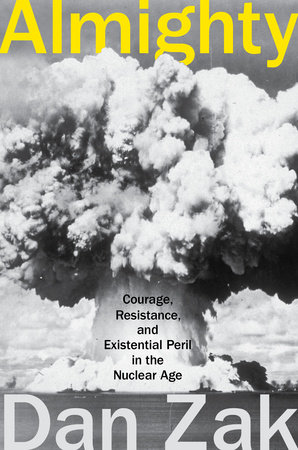 Almighty: Courage, Resistance, and Existential Peril in the Nuclear Age Dan Zak (Blue Rider Press) $27.00 I wrote a bit about this above and in a big December post naming books that might make good gifts, suggesting this for anyone involved in peacemaking, protest, or who wants to see how America’s nuclear weapon’s program developed and has been resisted by an underground movement of faith-based folks inspired by the likes of Dan and Phil Berrigan. I’ve admitted before that I have been found with some of these folks and have participated in some of these kinds of dramatic actions of civil disobedience before, so in a way this was reading about folks I know, including at least one event about which I had some very inside knowledge. So this was a very important book for me this year and I kept wondering how readers would feel about this big book if they where not already convinced that making nuclear weapons is (as the Roman Catholic church has said) is a sin (since to use them would be a sin.) It is my hunch that this is so well written and so dramatic and such a sprawling story that agree or not, many would find it hard to put down. It is a learned, important bit of social history, scientific expose, religious testimony and the chronicling of a movement of bravery and faith. It was one of my favorite books of the year.
Almighty: Courage, Resistance, and Existential Peril in the Nuclear Age Dan Zak (Blue Rider Press) $27.00 I wrote a bit about this above and in a big December post naming books that might make good gifts, suggesting this for anyone involved in peacemaking, protest, or who wants to see how America’s nuclear weapon’s program developed and has been resisted by an underground movement of faith-based folks inspired by the likes of Dan and Phil Berrigan. I’ve admitted before that I have been found with some of these folks and have participated in some of these kinds of dramatic actions of civil disobedience before, so in a way this was reading about folks I know, including at least one event about which I had some very inside knowledge. So this was a very important book for me this year and I kept wondering how readers would feel about this big book if they where not already convinced that making nuclear weapons is (as the Roman Catholic church has said) is a sin (since to use them would be a sin.) It is my hunch that this is so well written and so dramatic and such a sprawling story that agree or not, many would find it hard to put down. It is a learned, important bit of social history, scientific expose, religious testimony and the chronicling of a movement of bravery and faith. It was one of my favorite books of the year.
 Boys in the Bunkhouse: Servitude and Salvation in the Heartland Dan Barry (Harper) $26.99 I reviewed this above so won’t repeat myself here, but it truly was one of the big books that I couldn’t — and still can’t — stop thinking about, a reading experience that I simply couldn’t escape. I hope you didn’t skip over my description above as it is epic, and, I think, important for us to consider. How did this happen? How do we miss the mistreatment of those with special needs, the vulnerable, those doing hard manual labor in our local factories and plants? What a piece of work this is, what a good writer the author is thoughtful and caring; after reading this I immediately ordered his own memoir so I could learn what led him to be the kind of man he is and the kind of journalist he has become. Wow. This is a great read.
Boys in the Bunkhouse: Servitude and Salvation in the Heartland Dan Barry (Harper) $26.99 I reviewed this above so won’t repeat myself here, but it truly was one of the big books that I couldn’t — and still can’t — stop thinking about, a reading experience that I simply couldn’t escape. I hope you didn’t skip over my description above as it is epic, and, I think, important for us to consider. How did this happen? How do we miss the mistreatment of those with special needs, the vulnerable, those doing hard manual labor in our local factories and plants? What a piece of work this is, what a good writer the author is thoughtful and caring; after reading this I immediately ordered his own memoir so I could learn what led him to be the kind of man he is and the kind of journalist he has become. Wow. This is a great read.
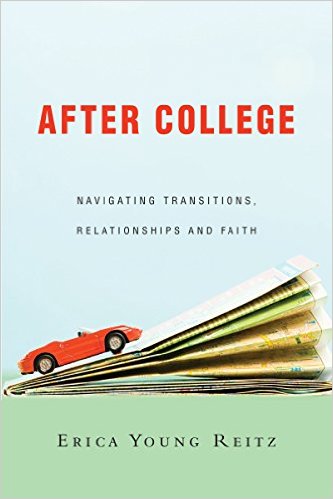 After College: Navigating Transitions, Relationships and Faith Erica Young Reitz (IVP) $16.00 I have reviewed this great book elsewhere at BookNotes and hope you recall it. It is a book, obviously, designed for college seniors or those right out of college and we can’t say how much it means to us to see it in print. Erica is a long-time supporter of our store, a very, very fine campus minister with the CCO, and she has specialized in this work of preparing collegiates to transition well into young adulthood after college. I know she is thoughtful and caring and a good writer — she did the afterward to my own book for young adults, Serious Dreams: Bold Ideas for the Rest of Your Life, after all. But when I got my hands on this when it released, and Beth and I started to read it, I was more than pleasantly surprised, I was deeply delighted at just how very good After College was. There are hundreds of very useful and inspiring books of basic Christian growth and books about maturing in faith and I get to skim a lot of them. Some are really good, and this is one of those — wonderfully written, drawing on great stories and the occasional well placed literary quote, written with charm and grace. I’ll admit I read it through the lens of my own friendship with the author who I so admire and also my own interest in my own young adult kids, not to mention many other young friends who I thought would enjoy it. But the fact of the matter is I was elated to read this, enjoyed it a lot, and think it is one of the great releases this year. Kudos to IVP for taking a chance on this first time author and doing right by her with this great release. Cheers!
After College: Navigating Transitions, Relationships and Faith Erica Young Reitz (IVP) $16.00 I have reviewed this great book elsewhere at BookNotes and hope you recall it. It is a book, obviously, designed for college seniors or those right out of college and we can’t say how much it means to us to see it in print. Erica is a long-time supporter of our store, a very, very fine campus minister with the CCO, and she has specialized in this work of preparing collegiates to transition well into young adulthood after college. I know she is thoughtful and caring and a good writer — she did the afterward to my own book for young adults, Serious Dreams: Bold Ideas for the Rest of Your Life, after all. But when I got my hands on this when it released, and Beth and I started to read it, I was more than pleasantly surprised, I was deeply delighted at just how very good After College was. There are hundreds of very useful and inspiring books of basic Christian growth and books about maturing in faith and I get to skim a lot of them. Some are really good, and this is one of those — wonderfully written, drawing on great stories and the occasional well placed literary quote, written with charm and grace. I’ll admit I read it through the lens of my own friendship with the author who I so admire and also my own interest in my own young adult kids, not to mention many other young friends who I thought would enjoy it. But the fact of the matter is I was elated to read this, enjoyed it a lot, and think it is one of the great releases this year. Kudos to IVP for taking a chance on this first time author and doing right by her with this great release. Cheers!
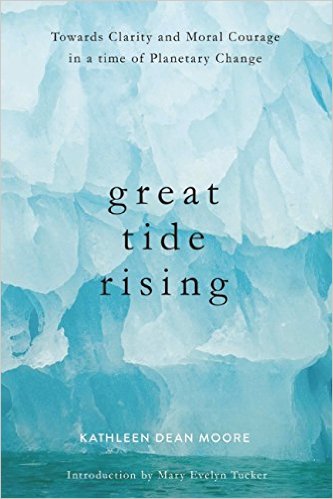 Great Tide Rising: Towards Clarity and Moral Courage in a Time of Planetary Change Kathleen
Great Tide Rising: Towards Clarity and Moral Courage in a Time of Planetary Change Kathleen
Dean Moore (Counterpoint) $26.00 I have said often that I will read any
new book by Kathleen Moore, such a fine and moving writer she is. I
suppose I’d say this was one of the most moving books I experienced this
year, with its remarkable prose, its coherent vision, its passion for
justice and goodness and living a life of meaning in the face of the
harms perpetrated upon the Earth. Some may find it a bit overwrought
and others might want a Biblical or theological perspective and this
does not offer that. But it is a sturdy, morally serious and, most
often, beautiful book of nature writing, solace, family, and the search
for meaningful action in a time of climate change. I enjoy her prose, an I’m pressed with her comfort in the rough outdoors and her enjoyment of the beauty of land and sea, creatures great and small. And I am challenged by her passion to know what to do, knowing what we do know. This is an important book, beautiful, sophisticated and demanding and a personal favorite, even though it is about some scary stuff.
SPECIAL KUDOS AND SALUTATIONS
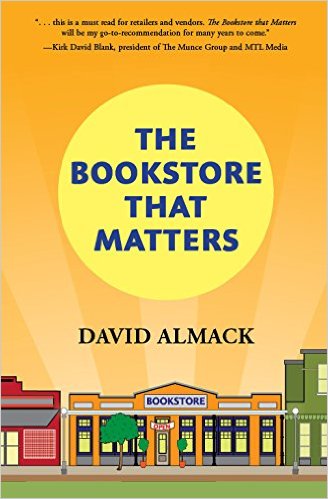 The Bookstore That Matters David Almack (FaithLit Publications) $14.99 I do hope a few of our favorite customers order this but I’ll admit it is mostly an in-house guide to running a Christian bookstore and therefore of most interest to fellow retailers or those in the religious publishing industry. David is a respected acquaintance and his telling of his work in Philadelphia as a book lover and book seller as one who sees the possibility of Christian bookstores as a key to ministry makes for a fine read for anybody who loves Christian literature. His legendary work in urban Philly is cool, too — he’s brought in Christian hip hop artists and done all kinds of literacy work and outreach through the CLC shops. That he very kindly mentions Hearts & Minds and commends our BookNotes reviews is a very serious compliment and I am deeply gratified to have found our work mentioned in this book. Thanks, Dave.
The Bookstore That Matters David Almack (FaithLit Publications) $14.99 I do hope a few of our favorite customers order this but I’ll admit it is mostly an in-house guide to running a Christian bookstore and therefore of most interest to fellow retailers or those in the religious publishing industry. David is a respected acquaintance and his telling of his work in Philadelphia as a book lover and book seller as one who sees the possibility of Christian bookstores as a key to ministry makes for a fine read for anybody who loves Christian literature. His legendary work in urban Philly is cool, too — he’s brought in Christian hip hop artists and done all kinds of literacy work and outreach through the CLC shops. That he very kindly mentions Hearts & Minds and commends our BookNotes reviews is a very serious compliment and I am deeply gratified to have found our work mentioned in this book. Thanks, Dave.
AND: THE BOOK I‘M MOST EAGER TO PROMOTE IN 2017 AS SOON AS IT RELEASES NEXT WEEK
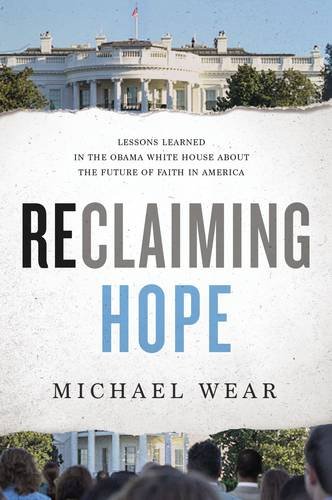 Reclaiming Hope: Lessons Learned in the Obama White House About the Future of Faith in America Michael Wear (Nelson Books) $25.99 Within the week I will post a review of this major release — PRE-ORDER IT NOW if you’d like and we will send it to you the day it releases Januray 17th; it will surely be on my list next year this time as one of the great books of 2017. Nearly a decade ago, Michael dropped out of college to work in the inspiring first campaign of Senator Obama and watched as he appealed widely to the broad faith community in the US — evangelical Rick Warren prayed at his first inaugural, you might recall. Michael is a theologically traditional evangelical and an idealistic Democrat which makes him not rare, but not commonplace, either. I admire him greatly for his conscientious, Biblically-informed balance and thoughtfulness about politics, public service, and the common good. He ended up working alongside the President in the White House in a position at the intersection of faith, politics and public life.
Reclaiming Hope: Lessons Learned in the Obama White House About the Future of Faith in America Michael Wear (Nelson Books) $25.99 Within the week I will post a review of this major release — PRE-ORDER IT NOW if you’d like and we will send it to you the day it releases Januray 17th; it will surely be on my list next year this time as one of the great books of 2017. Nearly a decade ago, Michael dropped out of college to work in the inspiring first campaign of Senator Obama and watched as he appealed widely to the broad faith community in the US — evangelical Rick Warren prayed at his first inaugural, you might recall. Michael is a theologically traditional evangelical and an idealistic Democrat which makes him not rare, but not commonplace, either. I admire him greatly for his conscientious, Biblically-informed balance and thoughtfulness about politics, public service, and the common good. He ended up working alongside the President in the White House in a position at the intersection of faith, politics and public life.
Wear was one of Obama’s “ambassadors to America’s believers” (as Buzzfeed called him) and one of the youngest White House staffers in modern American history; he wasn’t yet 21 when he took up his job with the Obama Administration. This book is Michael’s own recollections and analysis on everything from the earliest days of his own faith journey and how and why he got involved in politics, and, eventually, the controversies around Jeremiah Wright, for instance, and the dis-inviting of Louis Giglio from the second Inaugural (quite a contrast to the previous “big tent” approach four years earlier.) From the religious implications of health care reform and the complicated matters of the President’s later advocacy for same sex marriage, an issue which he perhaps disingenuously said he “evolved” on, Michael brings insider insight, honed by his own faithful, Christian, evaluations. It has been an extraordinary and historic decade, of course, and Wear brings insight beyond his years. Reclaiming Hope is a very lively book, and I couldn’t put it down. Mr. Wear, in fact, will be appearing at our bookstore in March to tell us more about his years in the White House and the “lessons learned” that he shares so well in Reclaiming Hope. I read an advanced copy of the manuscript and although it is officially a 2017 release, it was one of my own personal favorite reads late this fall. I can’t wait to tell you more about it, soon. Congratulations, Michael. And thank you for your service to our country in what were complex and painful times. I’m grateful you tell your story, both the good and the bad, the sweet and bittersweet, and hope many order the book.
any item mentioned
10% OFF
order here
takes you to the secure Hearts & Minds order form page
just tell us what you want to order
inquire here
if you have questions or need more information
just ask us what you want to know
717-246-3333
